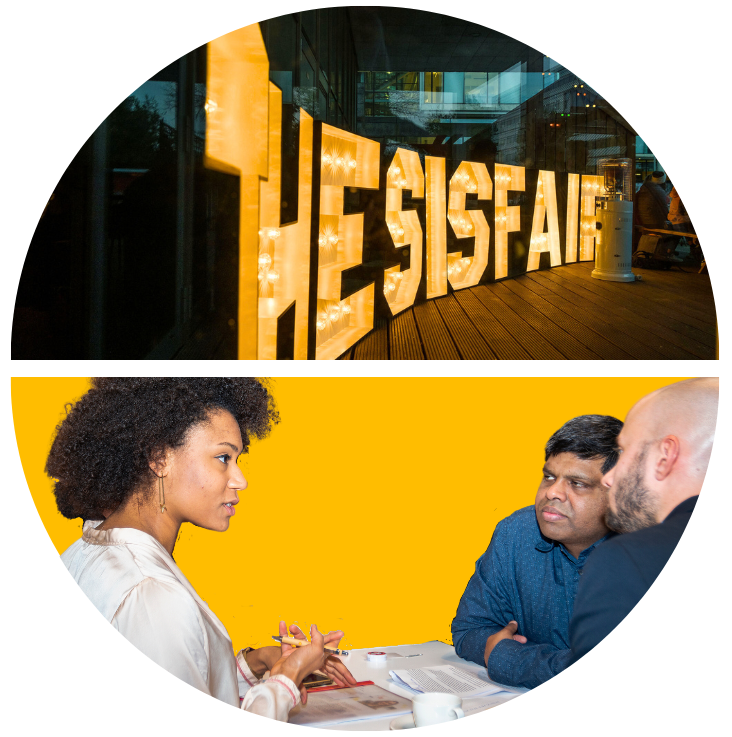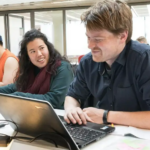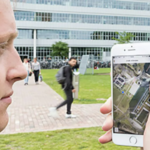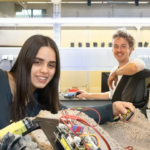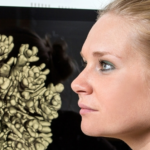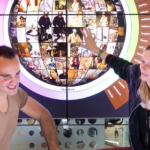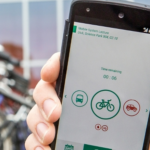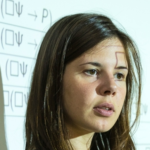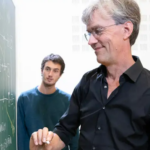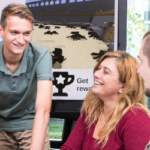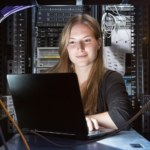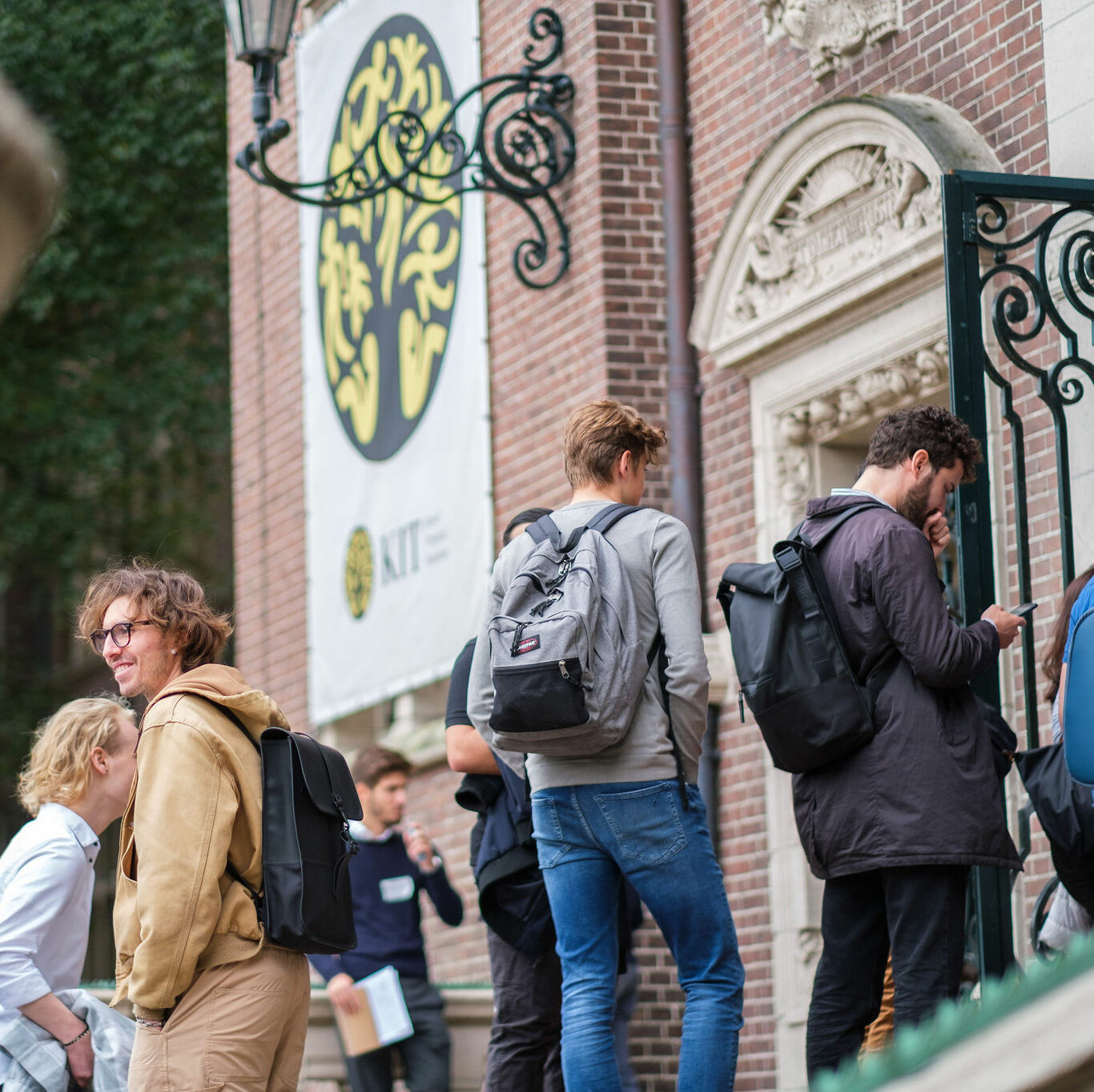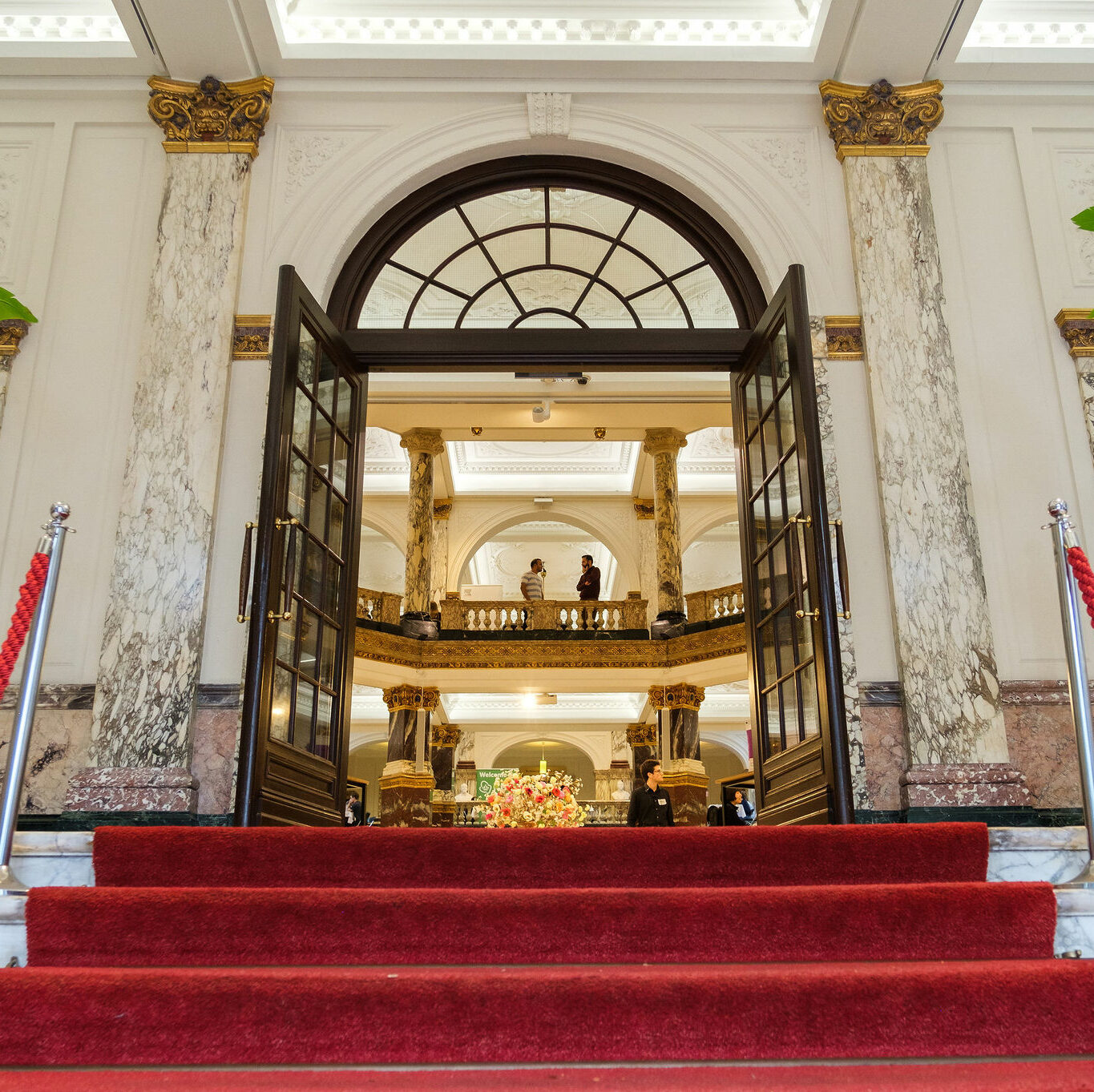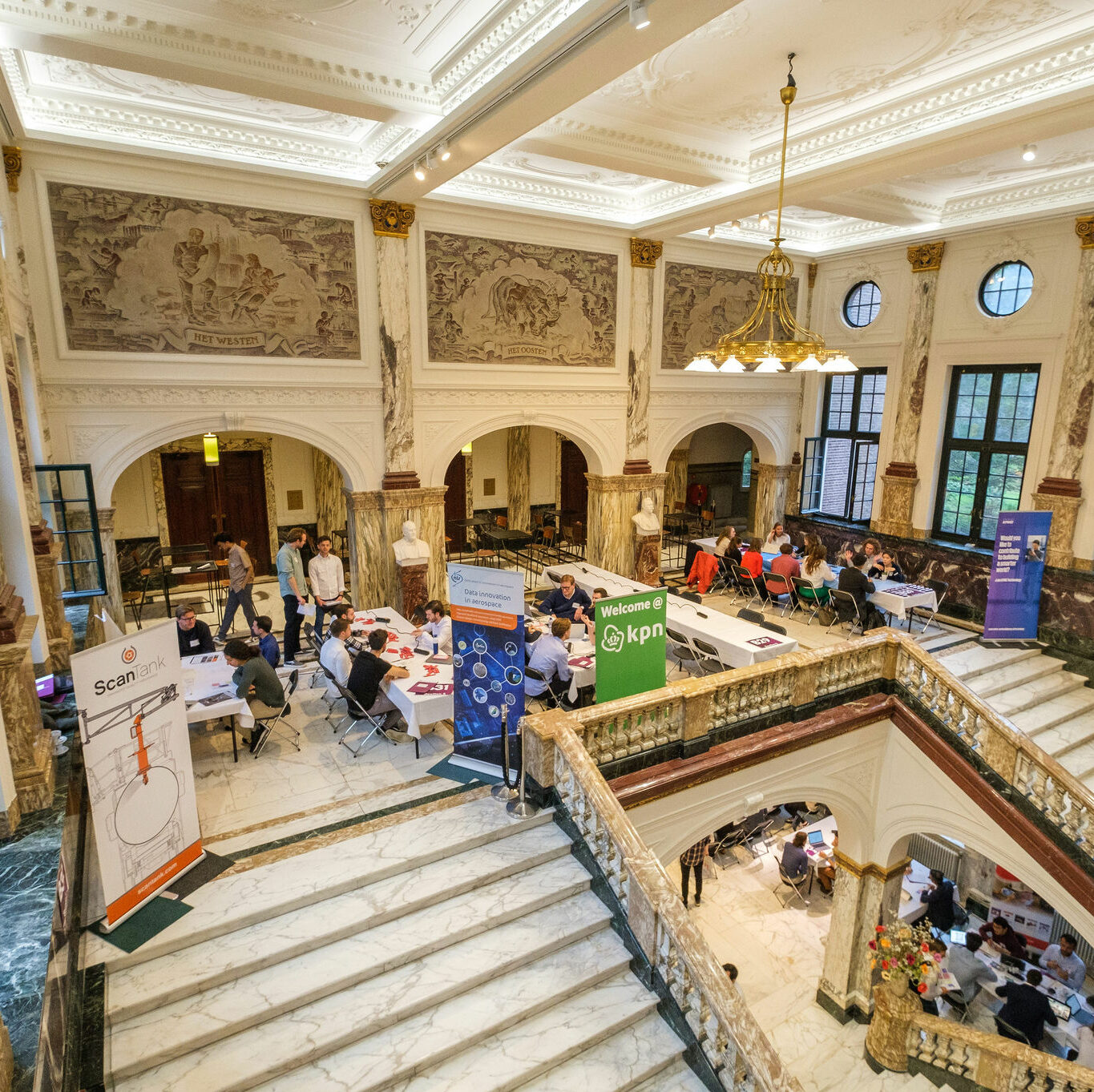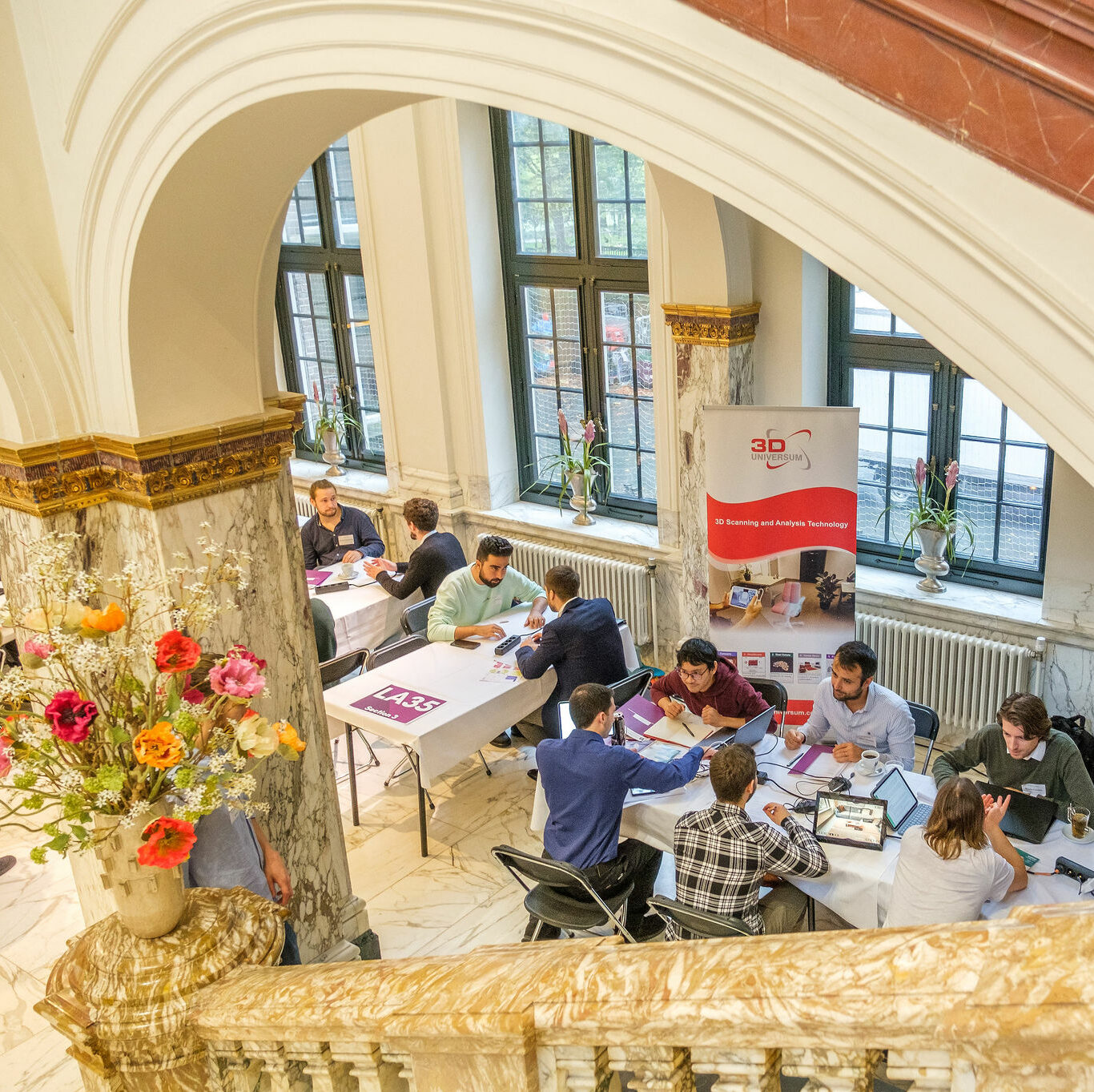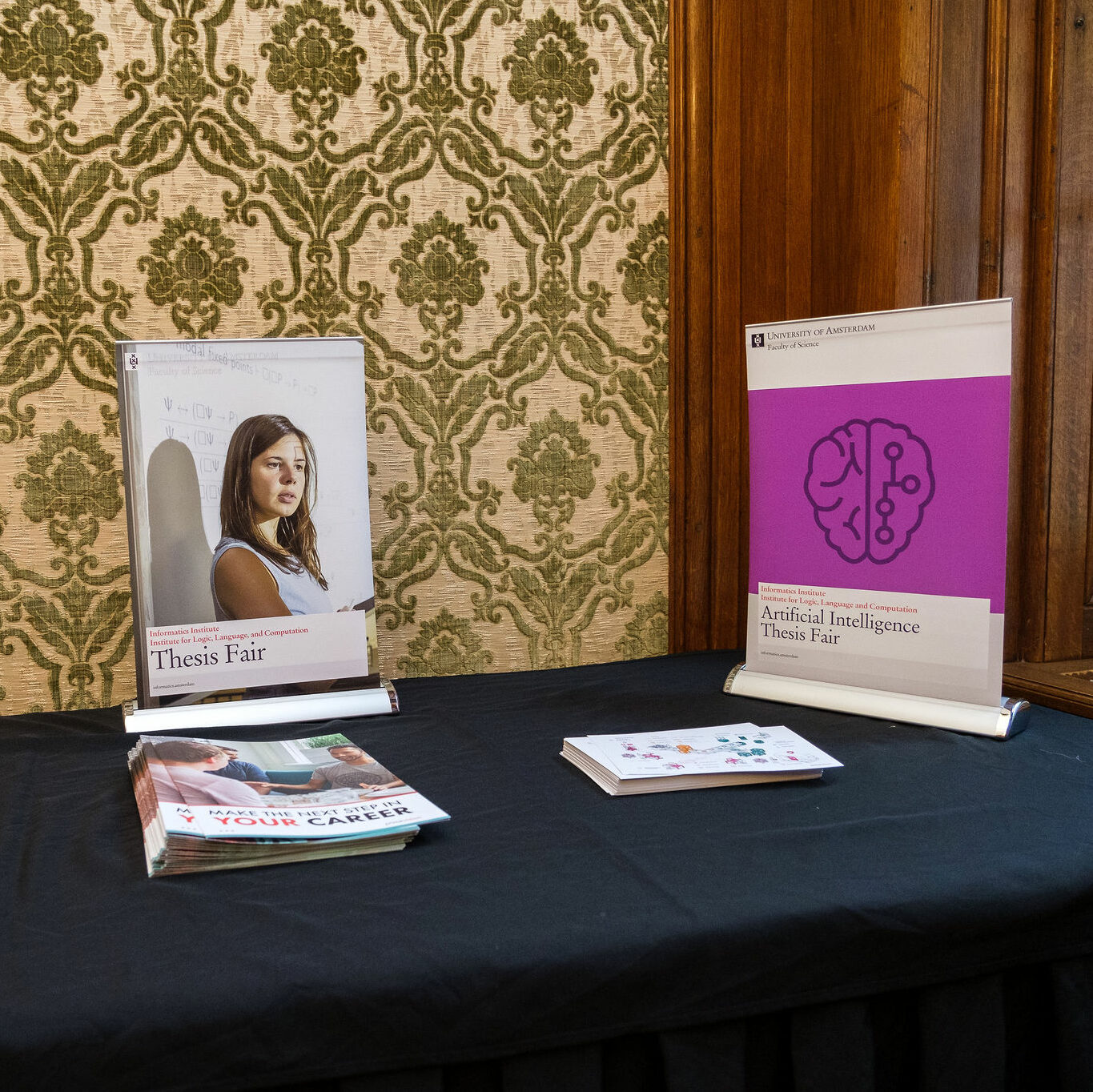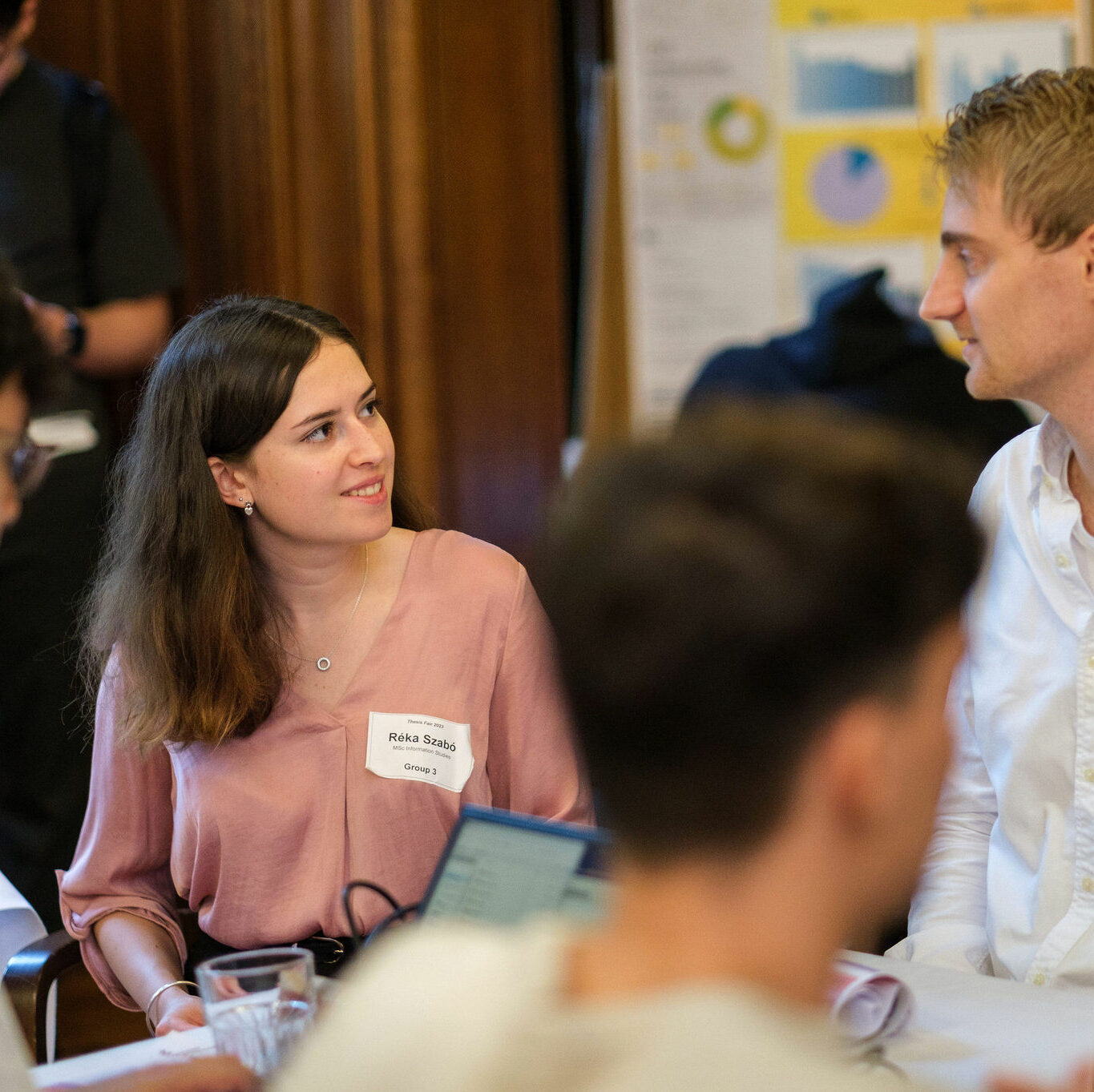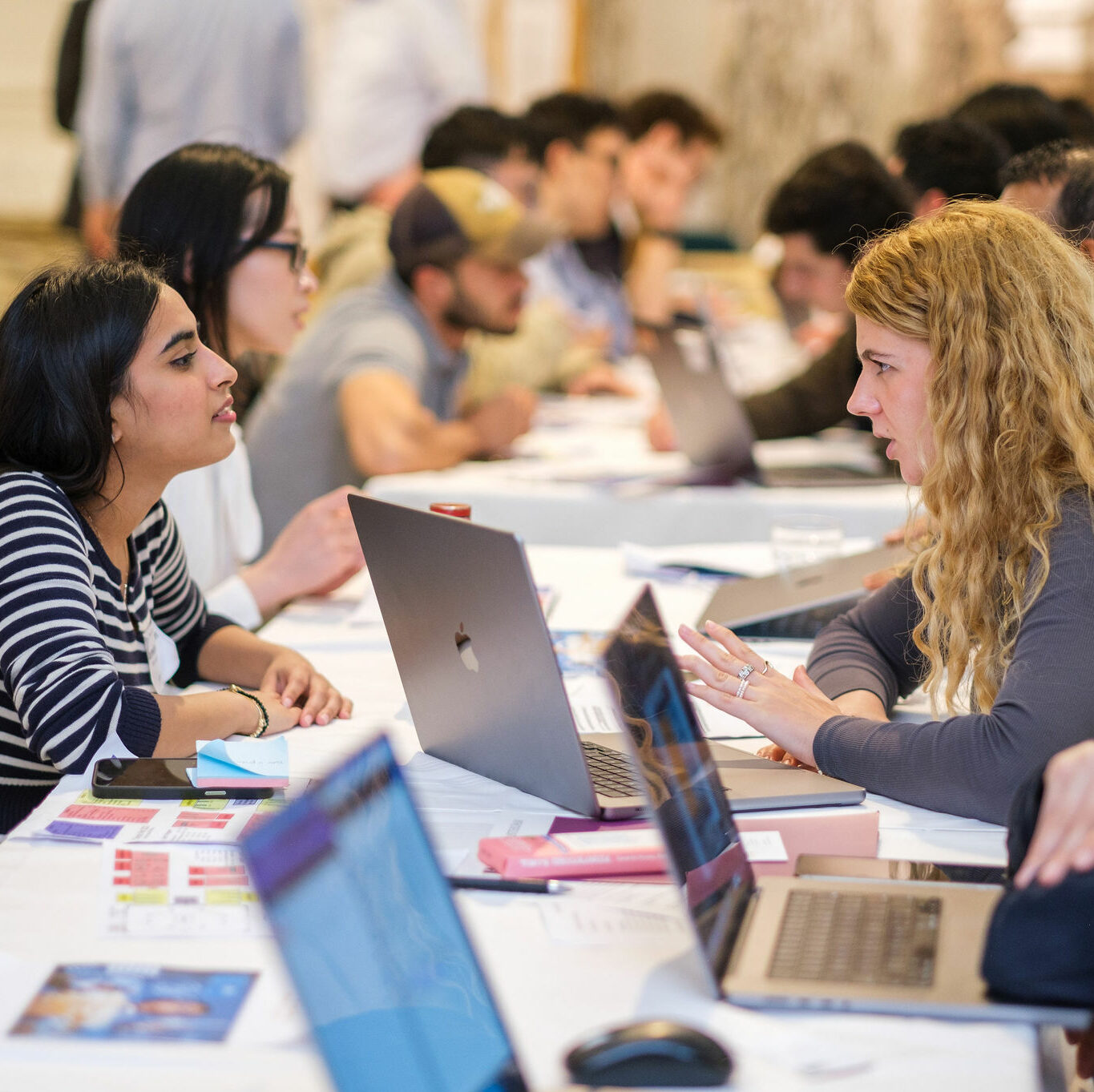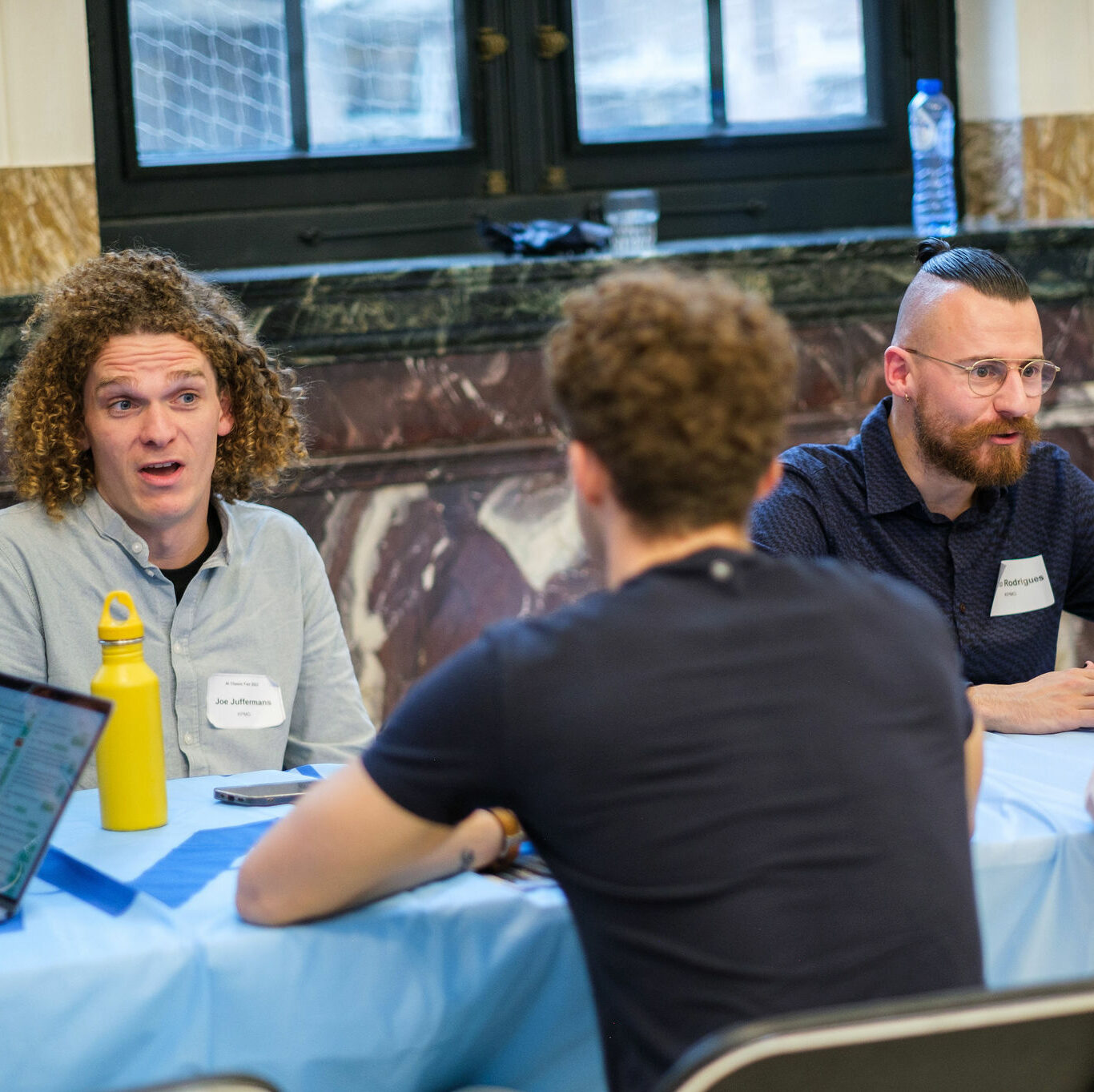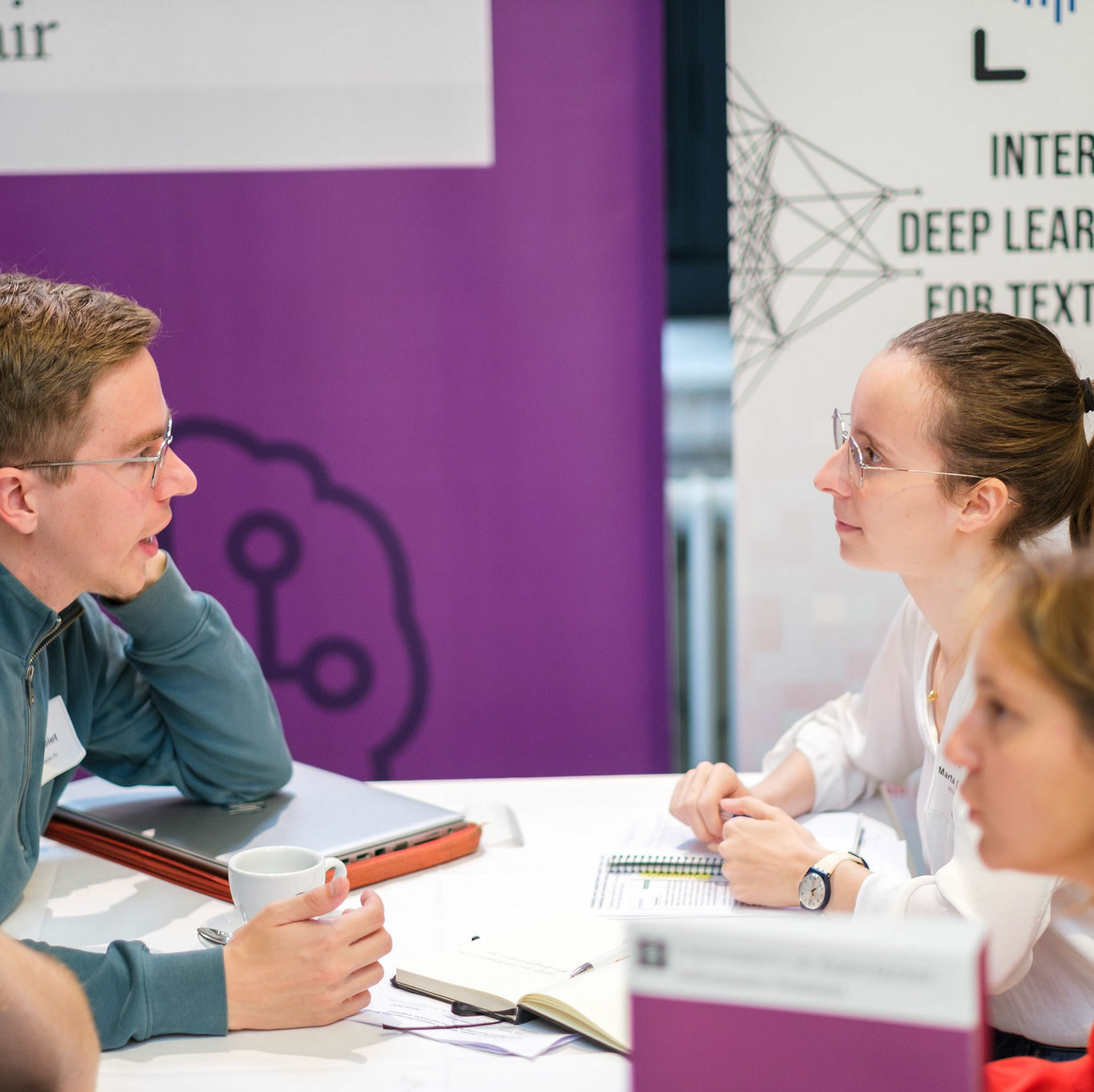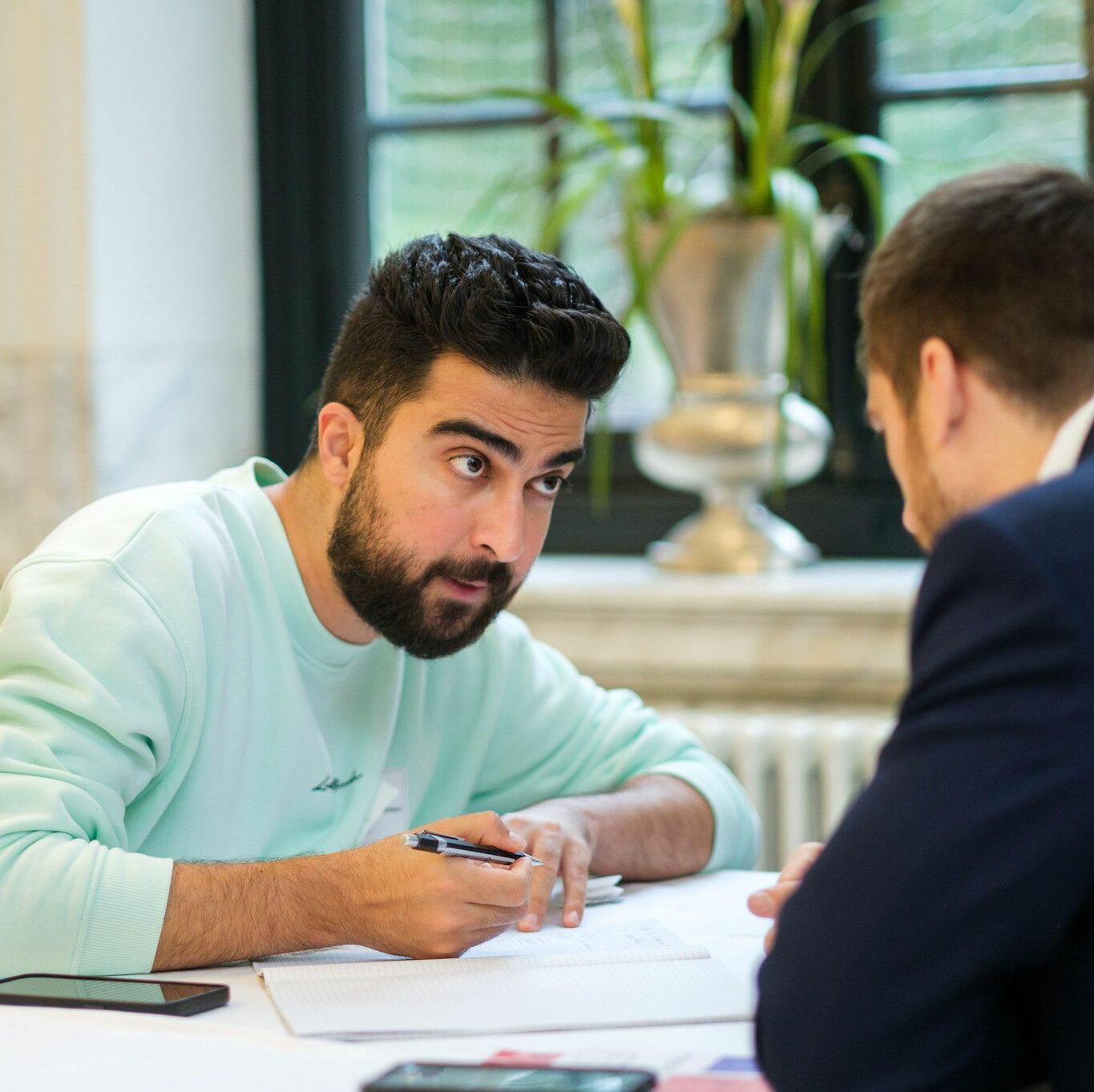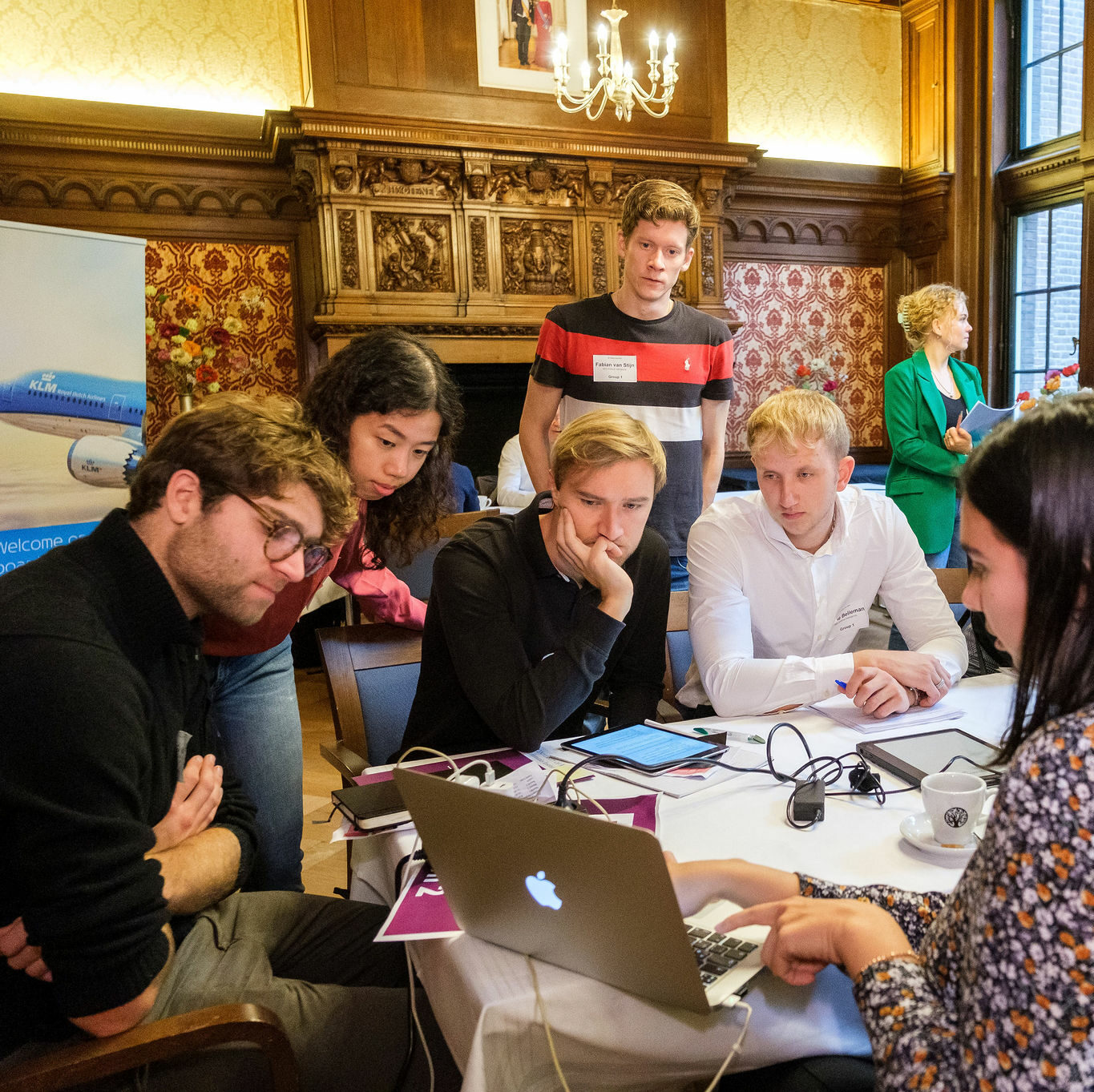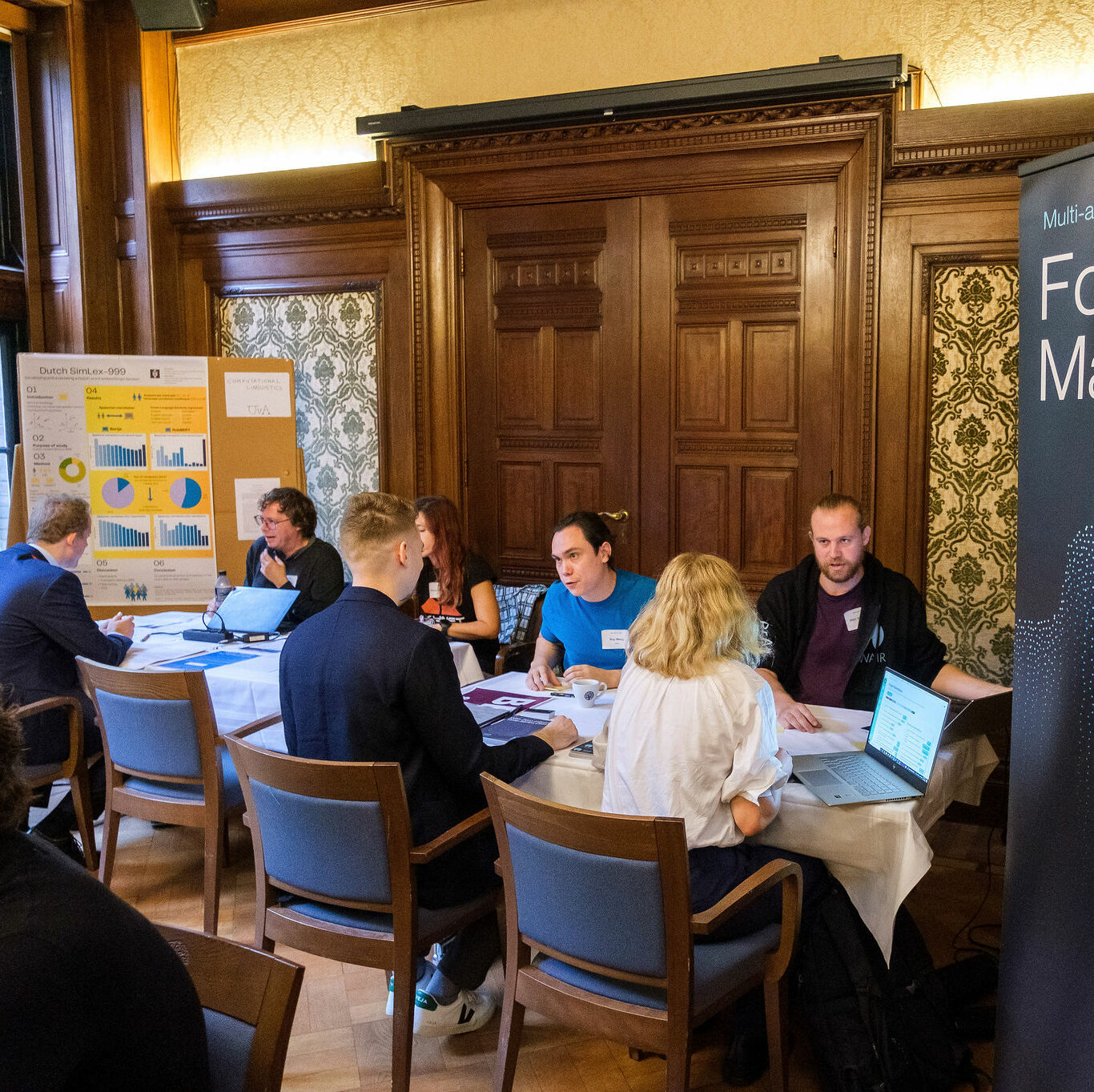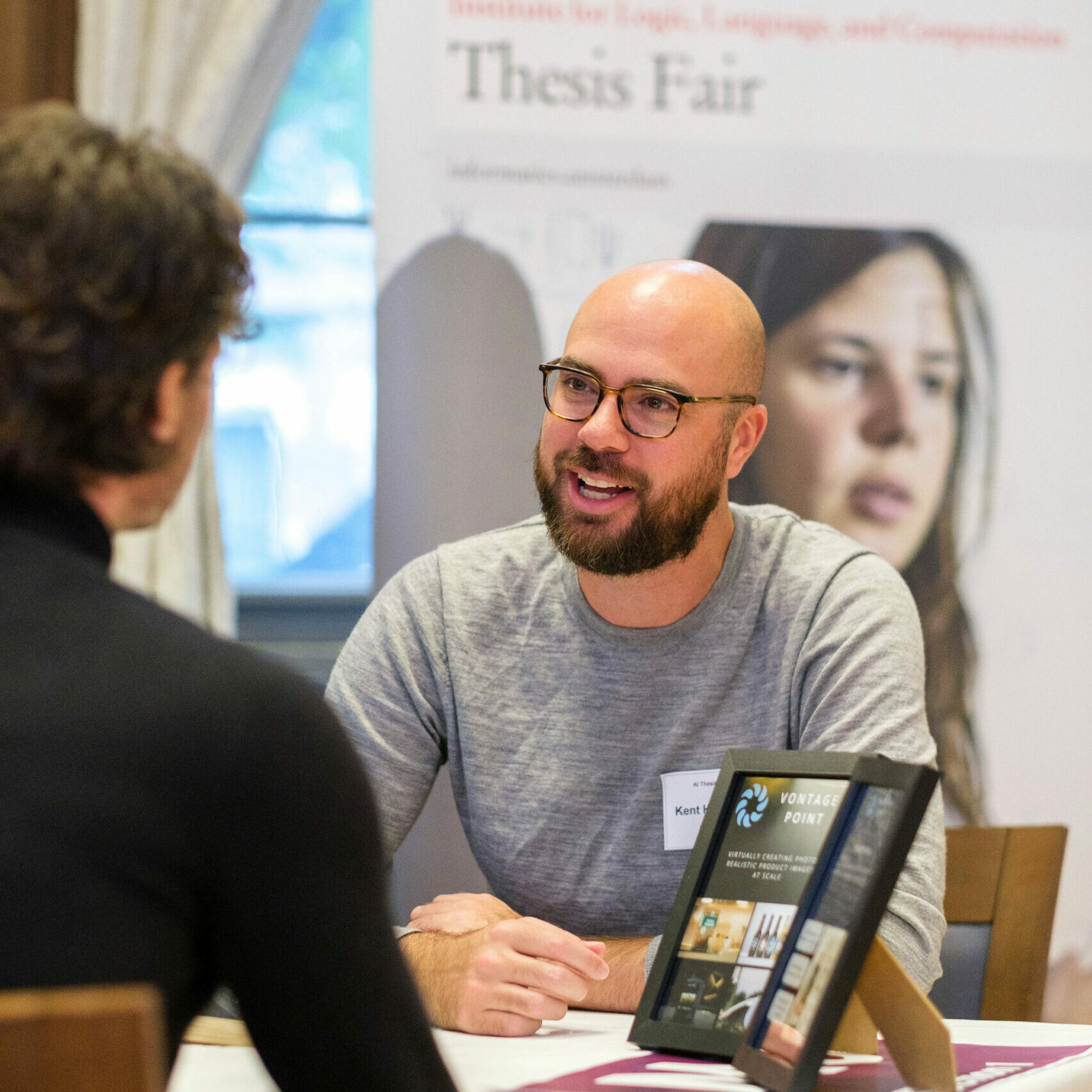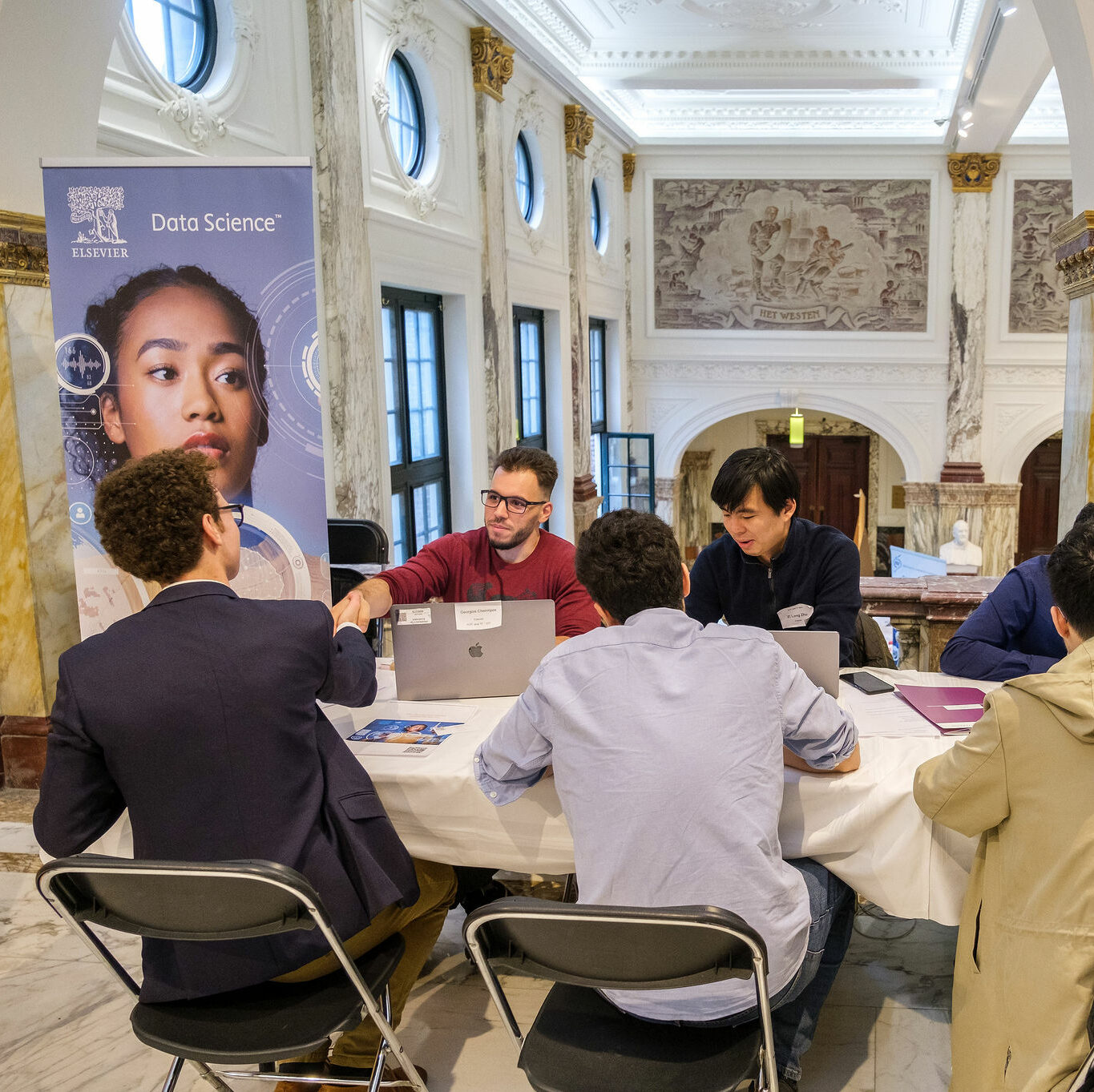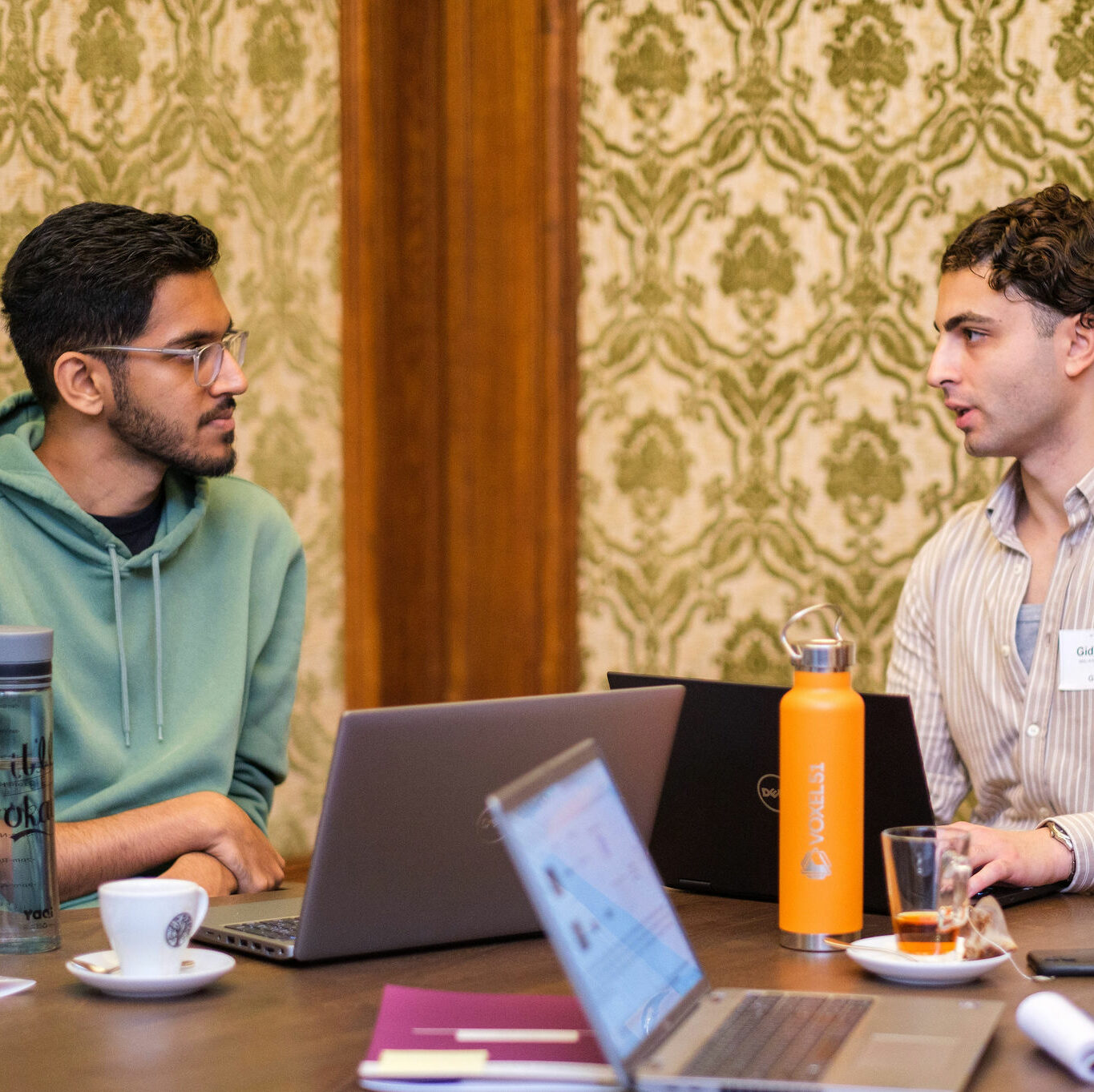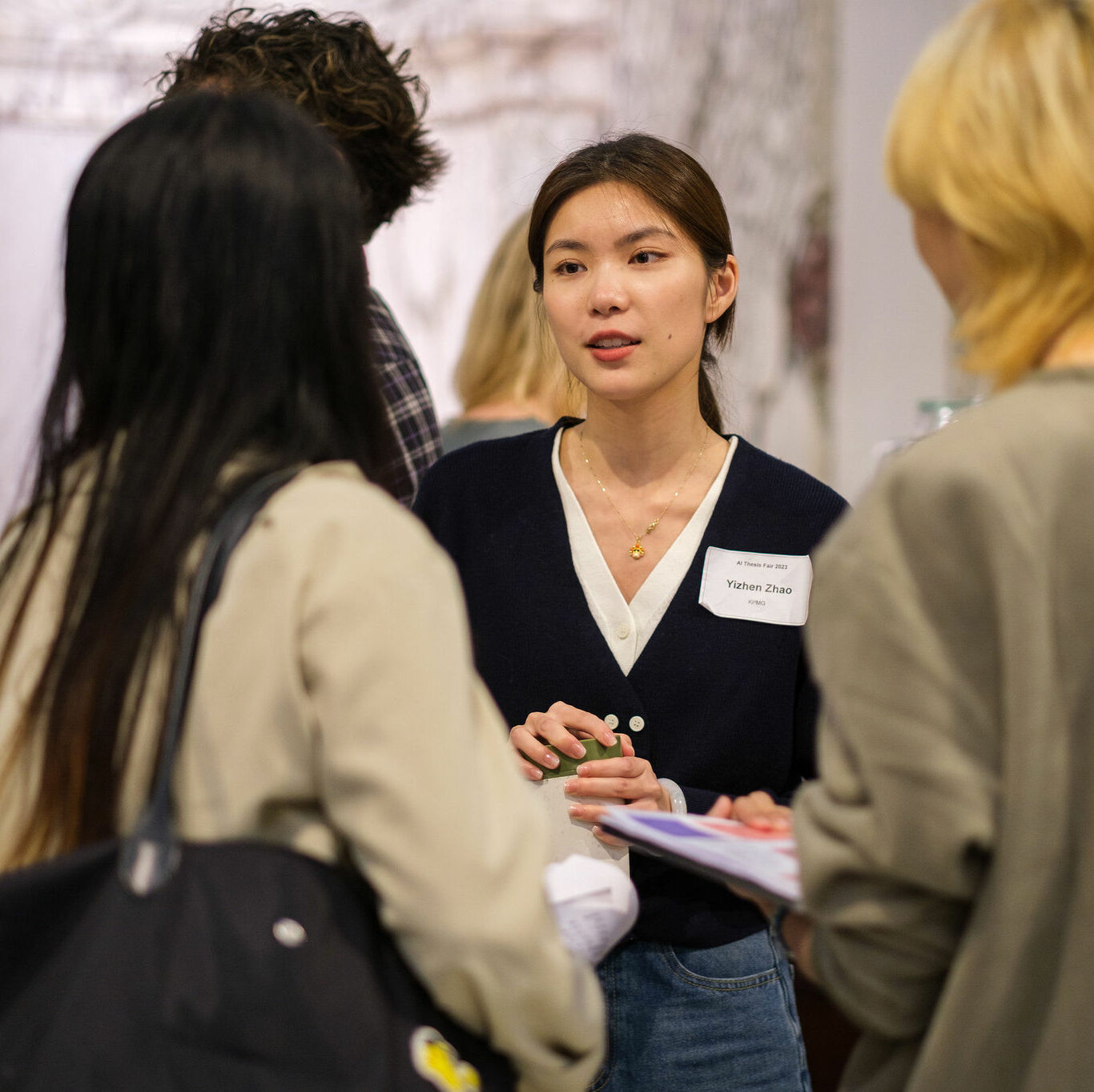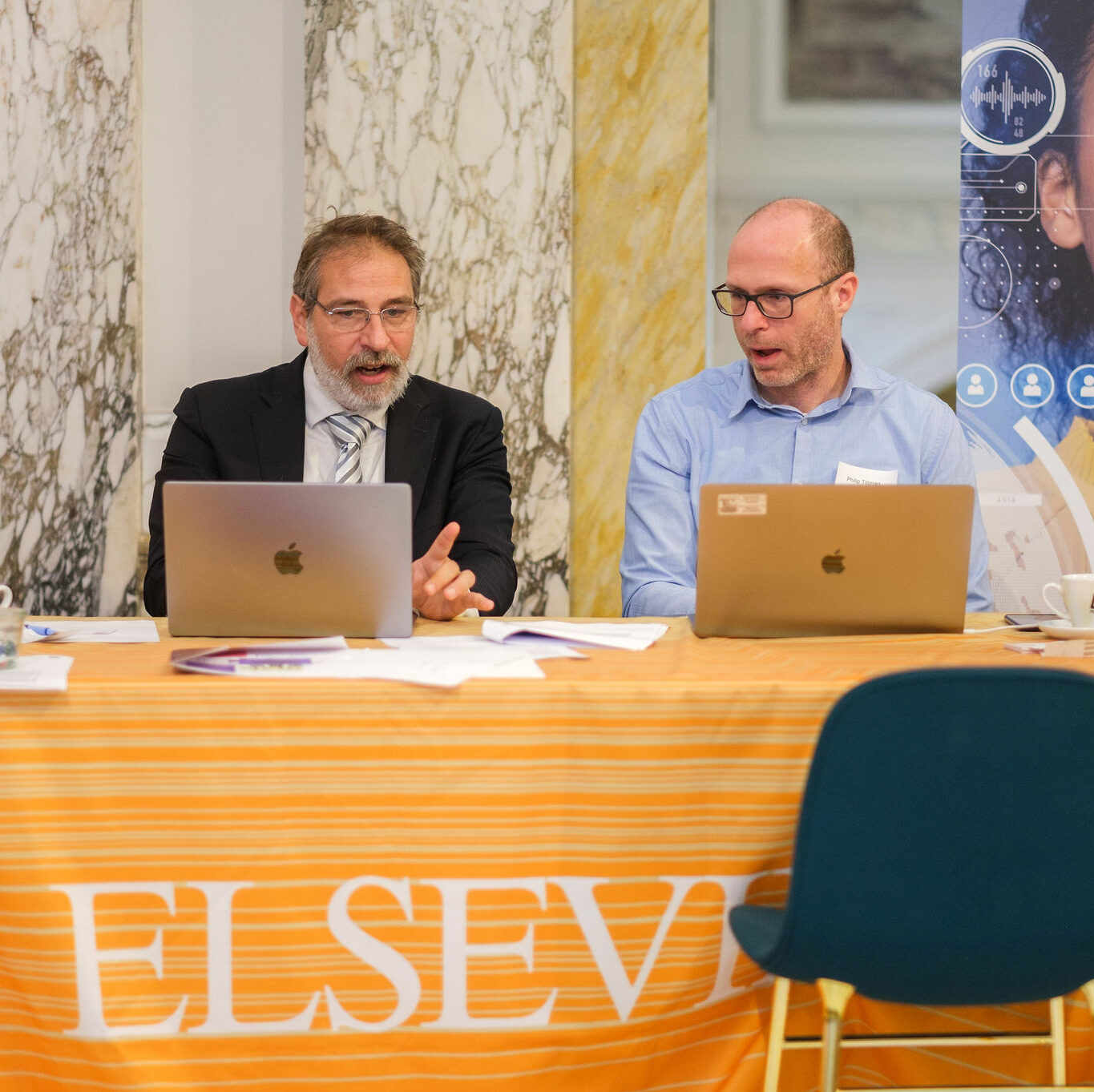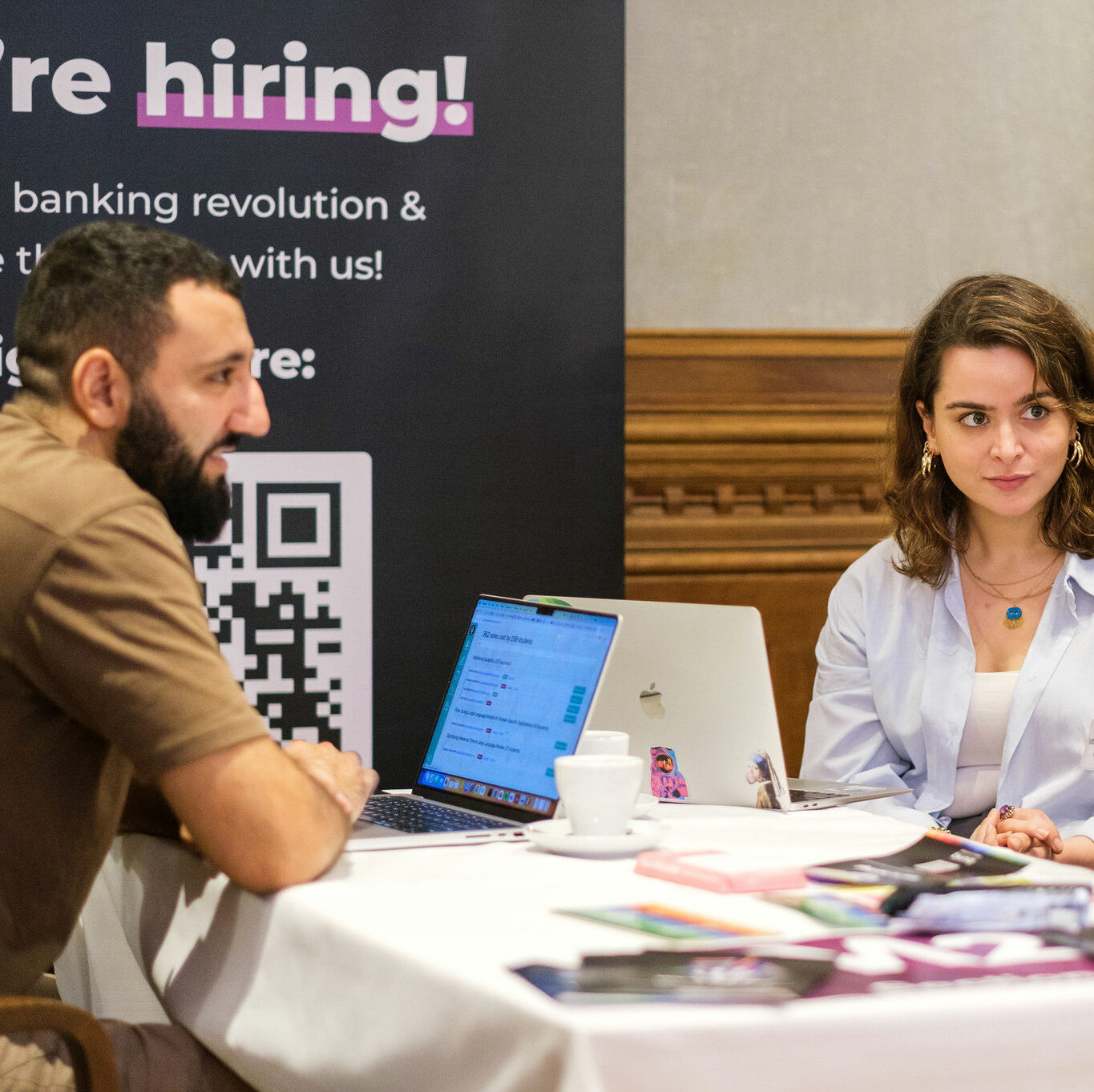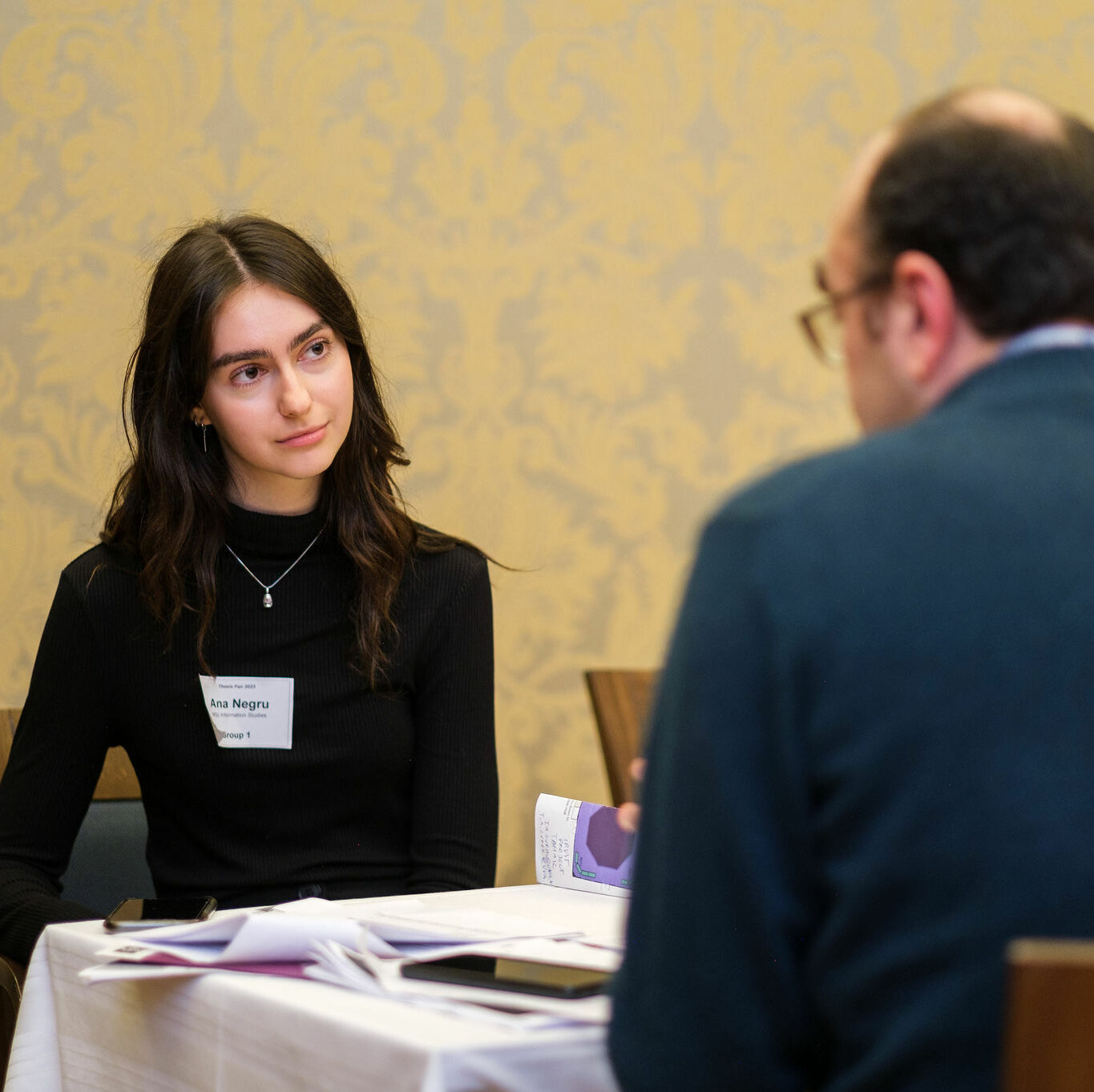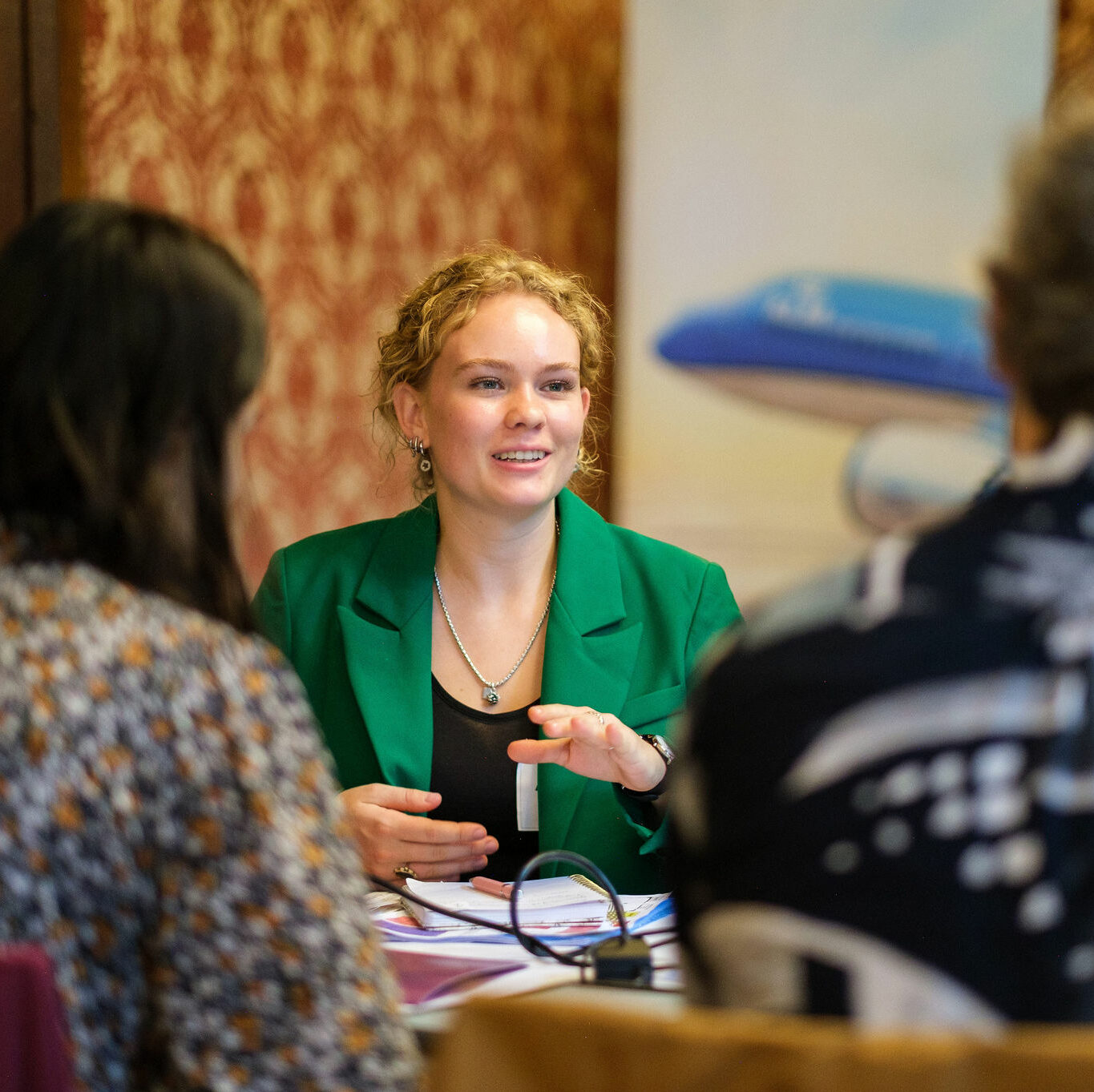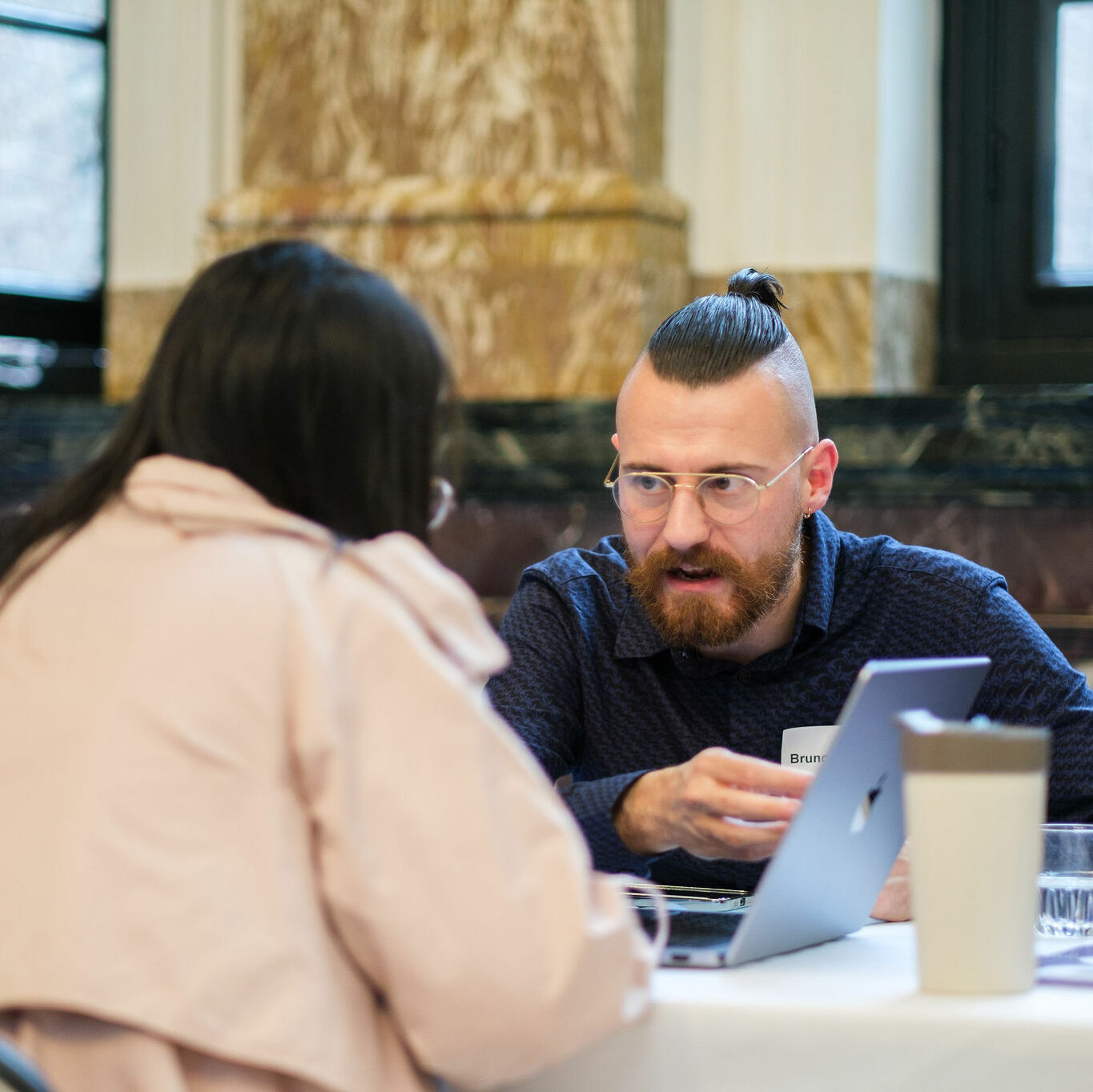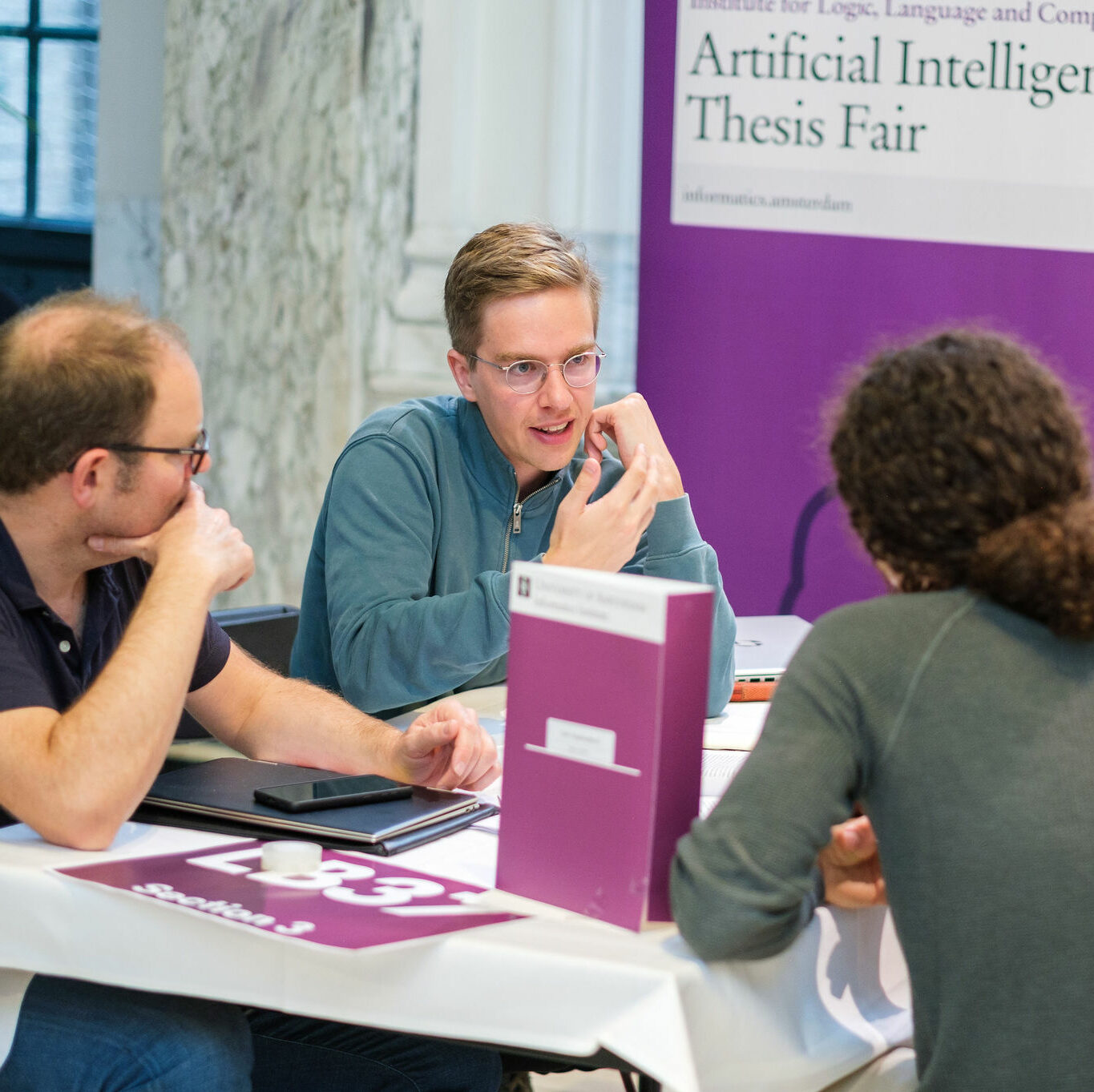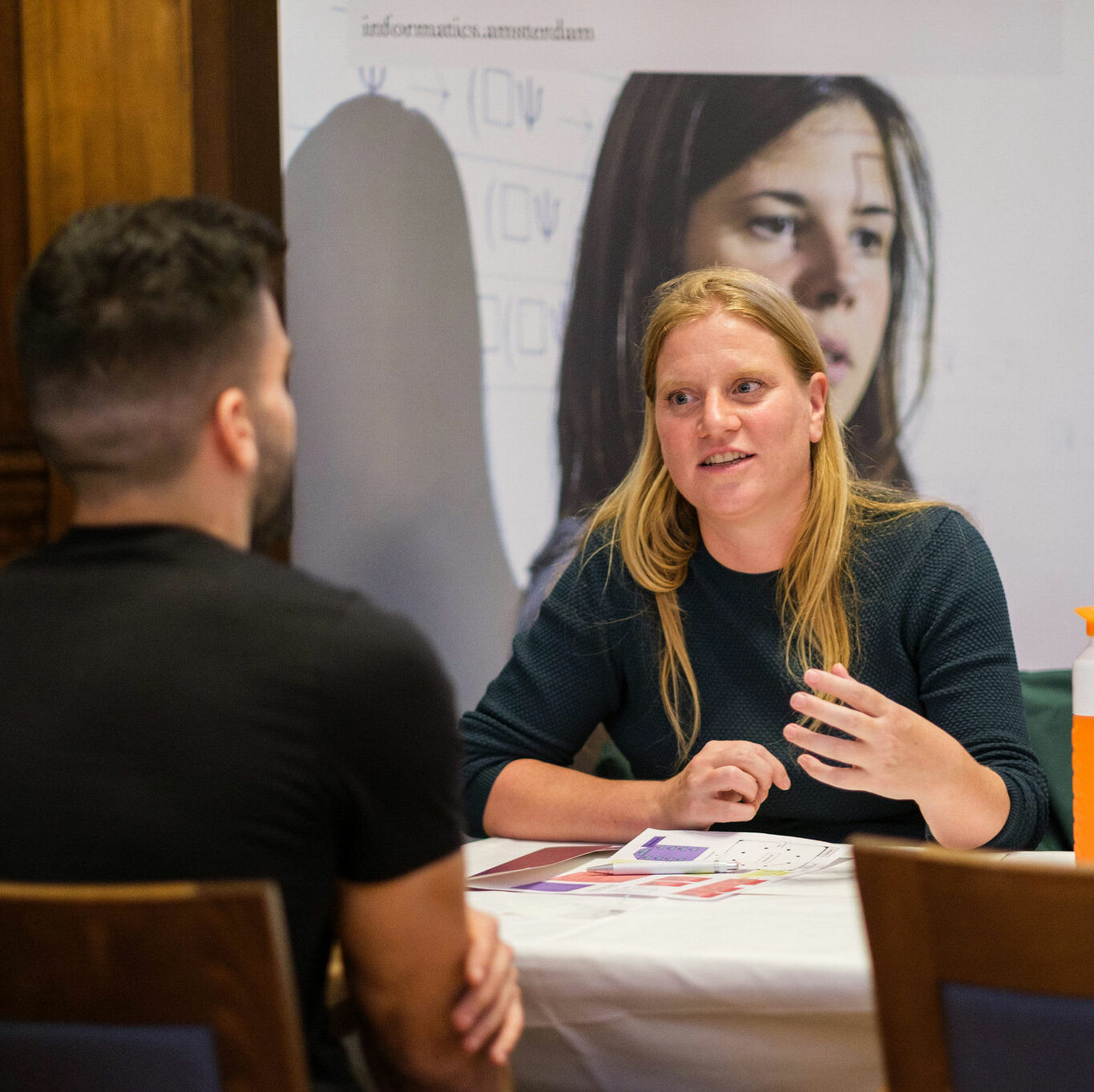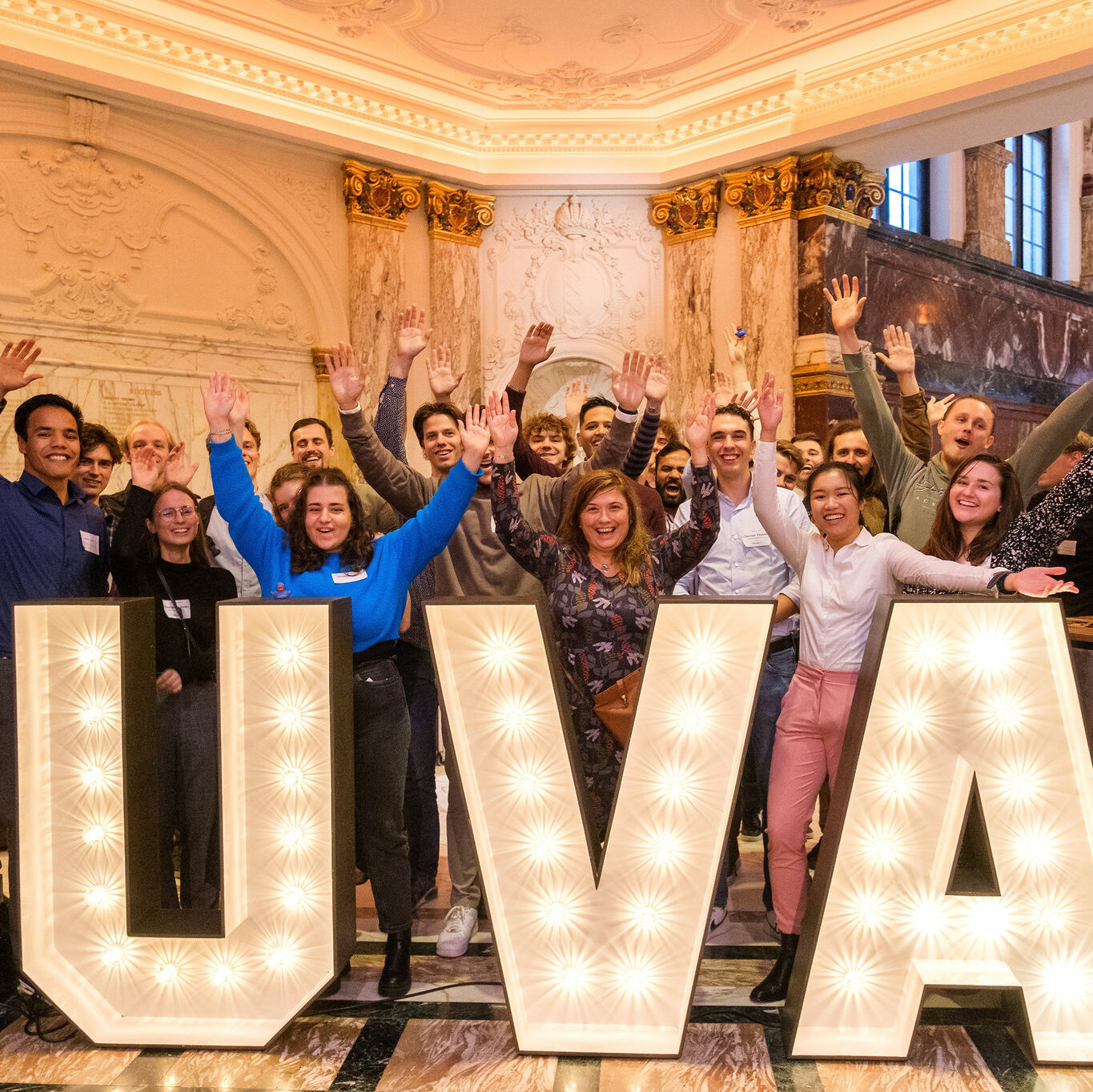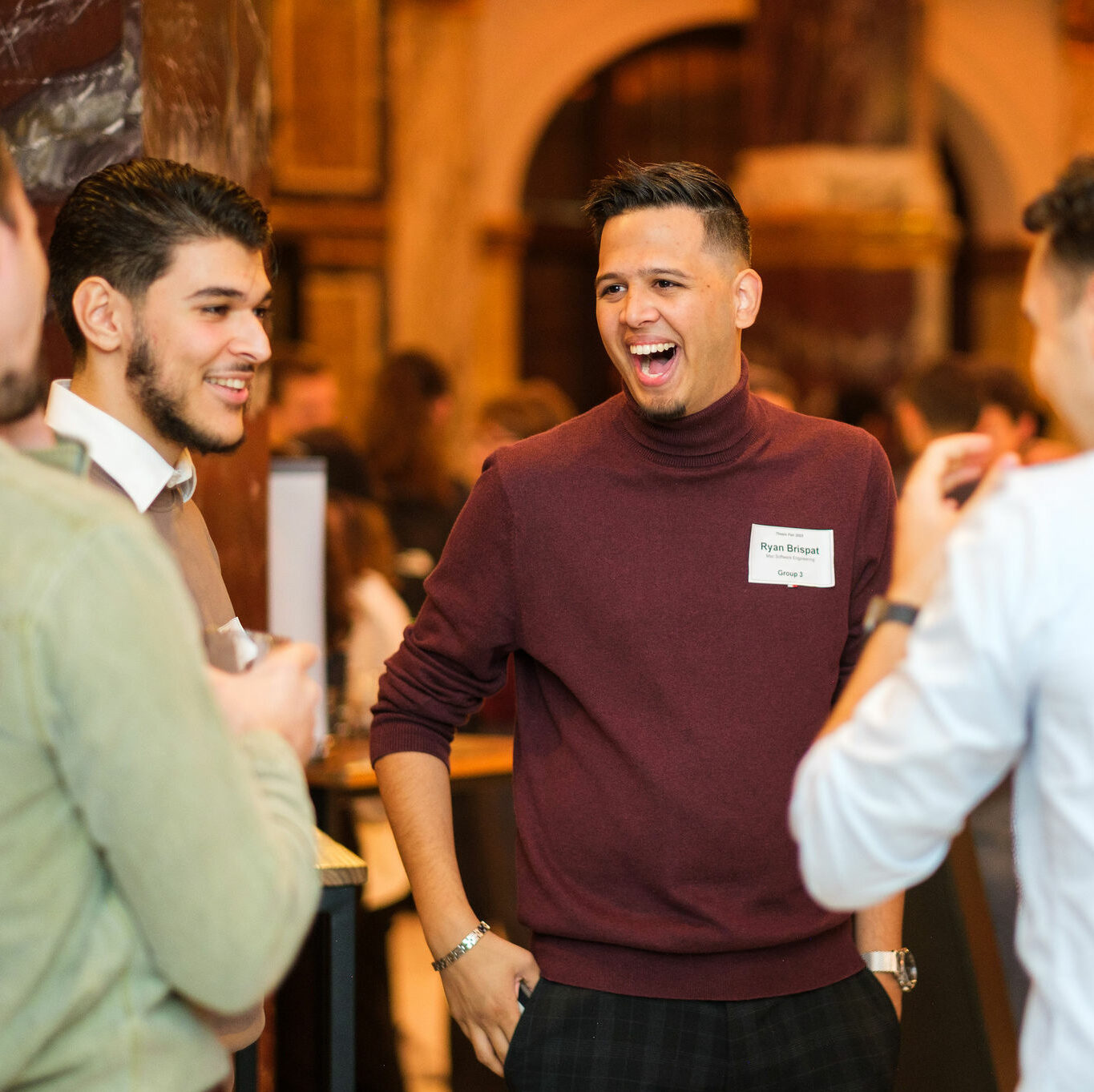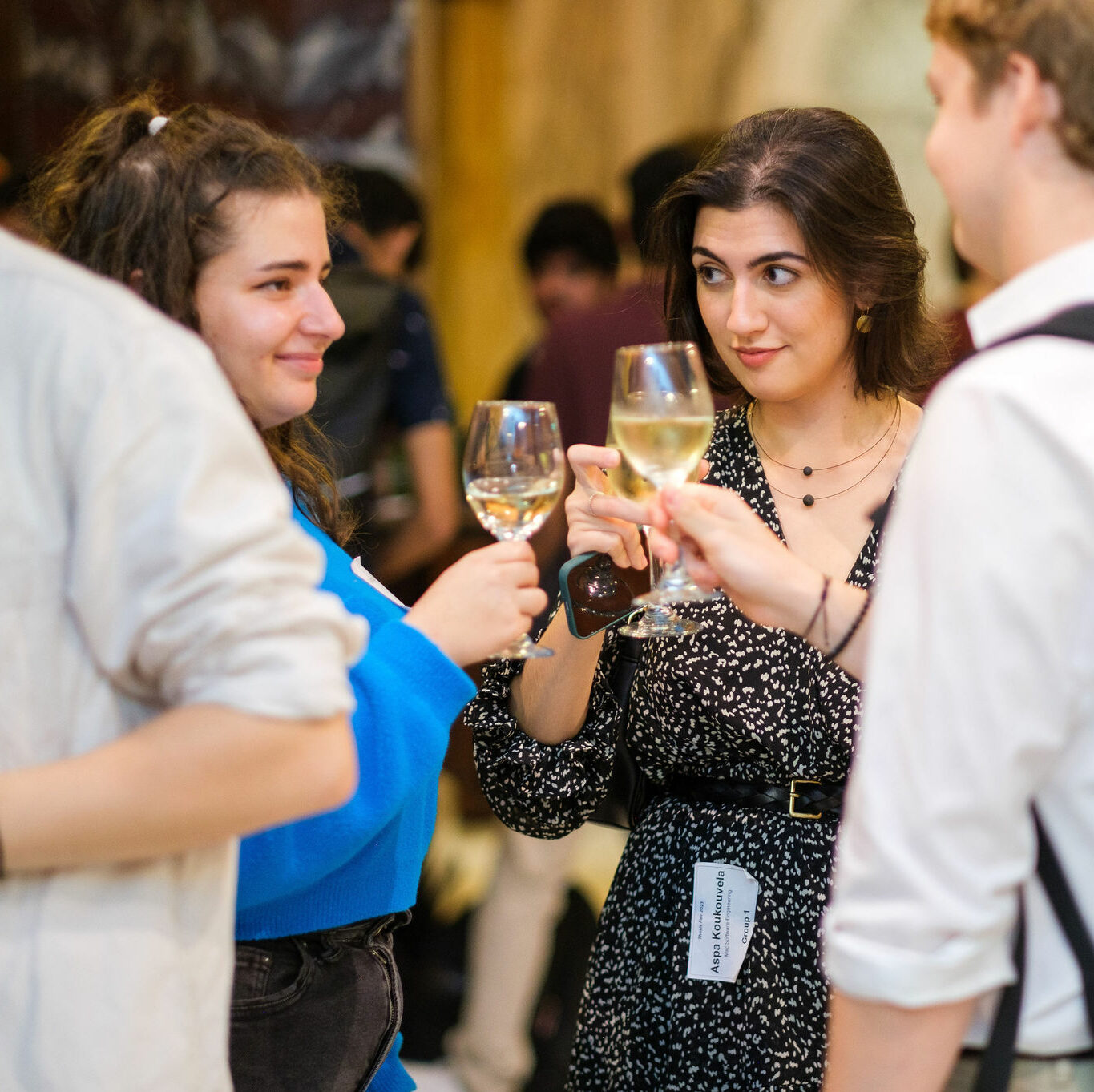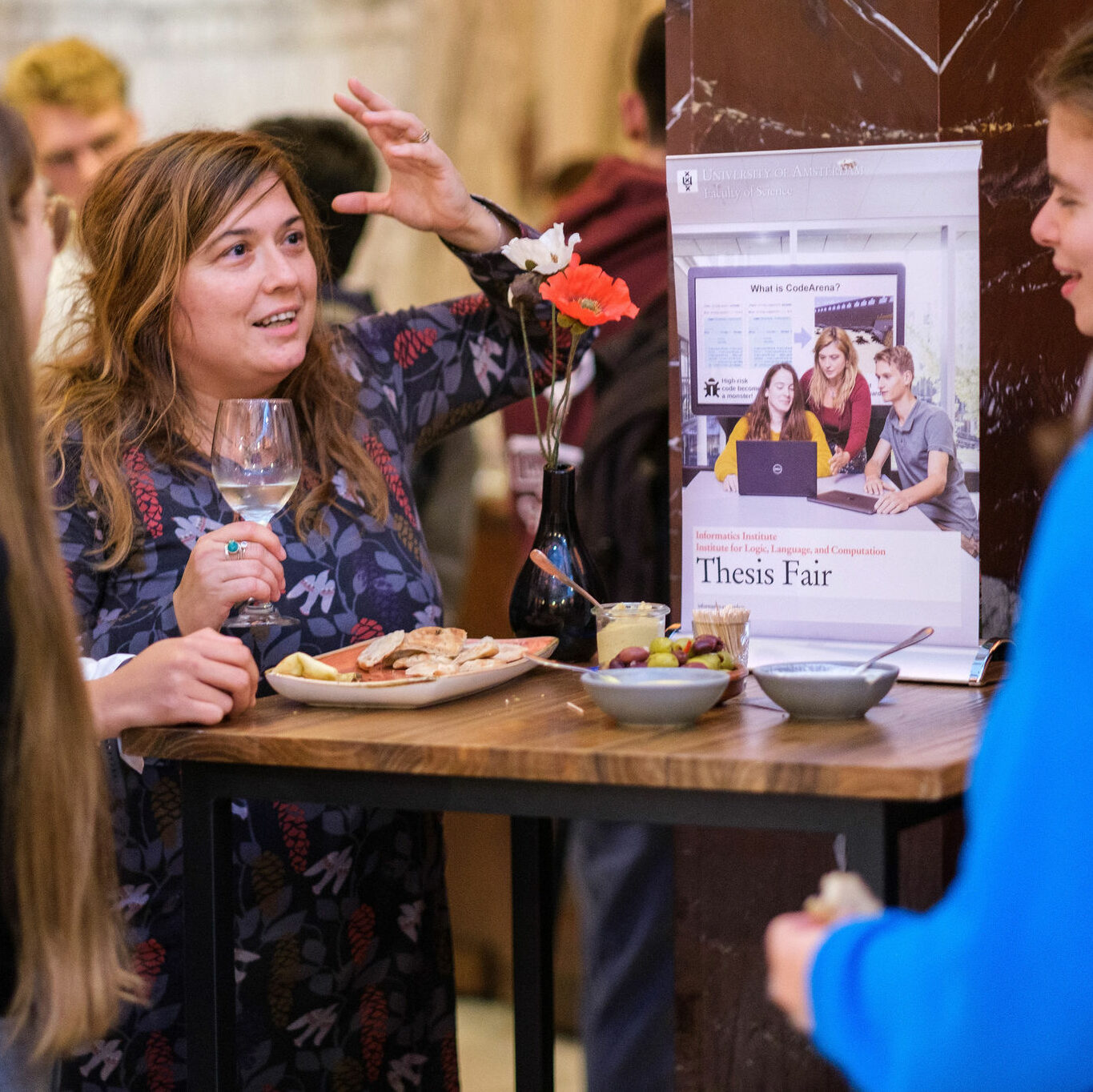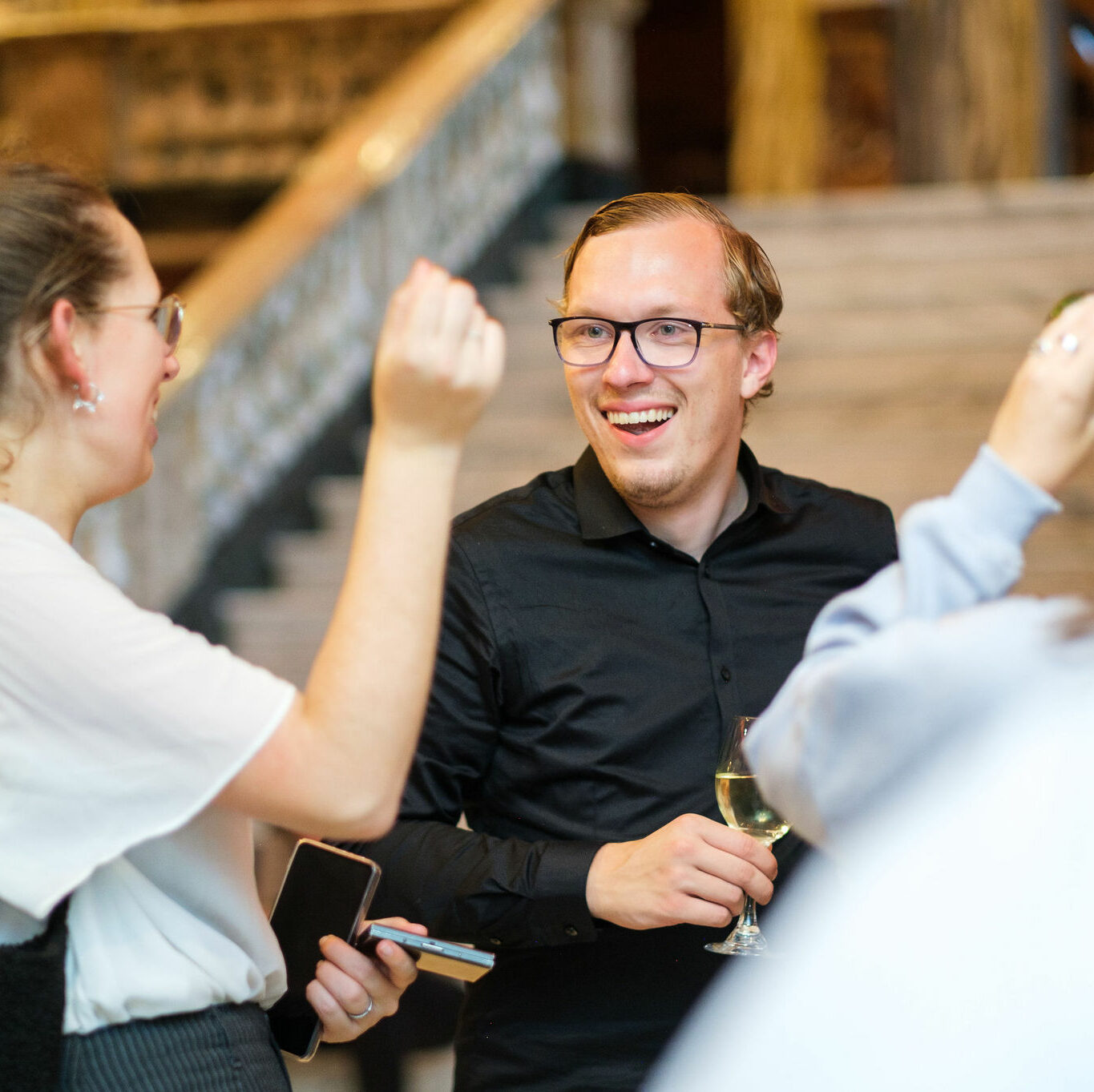About the Thesis Fair
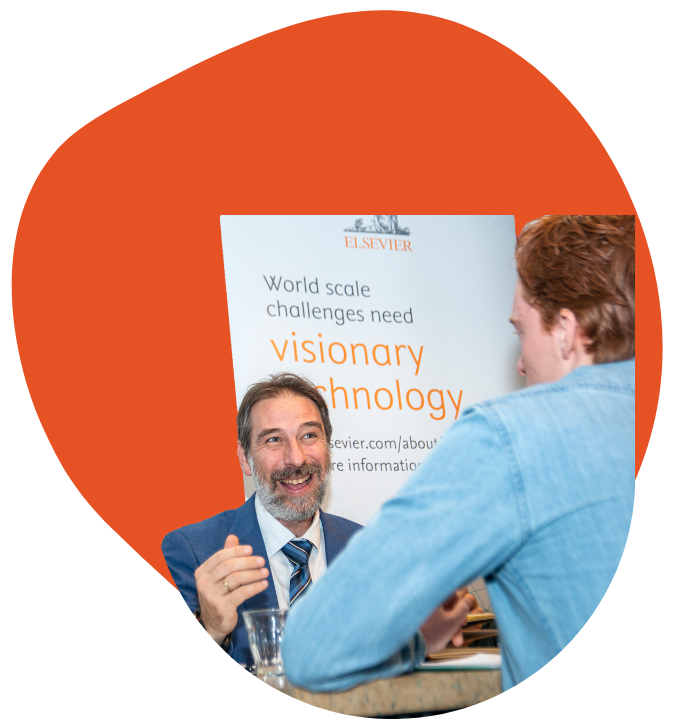
Friday, 17 October 2025
Project submissions are due Friday, 29 August 2025
Time: 8:30 – 18:30
8:30 – 12:45 AI Thesis Fair
12:45 – 13:45 break and set-up for newly arrived organisations and students
13:45 – 17:30 General Thesis Fair
17:30 – 18:30 Borrel and networking
Location: Royal Tropical Institute (KIT)
Mauritskade 63, 1092 AD Amsterdam
Developed initially in 2011 for students in Master Software Engineering, the Thesis Fair has since grown and is now available to 7 of our 8 programmes in The Graduate School of Informatics (GSI). Each year, approximately 400-500 students and over 200 representatives from research and industry participate, making it a highly anticipated occasion.
The AI Thesis Fair and General Thesis Fair are held on the same day, providing a comprehensive event for all participants. Starting at 8:30, the AI Thesis Fair will kick off, offering MSc AI students and interested organisations the opportunity to connect and engage until lunchtime. Participants of the AI Thesis Fair will also be provided with a delicious lunch to enjoy.
Following lunch, there will be a designated time for booth breakdown for organisations not participating in the second half of the event. During this time, new organisations will arrive and begin setting up their tables, preparing for the General Thesis Fair session. This session will be dedicated to students from six programmes: MSc Computational Science, MSc Computer Science, MSc Information Studies (Data Science Track and Information Systems Track), MSc Logic, MSc Software Engineering, and MSc Security and Network Engineering. Additionally, alongside the participants from the morning session, the General Thesis Fair will welcome additional organisations and Research Groups.
The event will conclude with a borrel, allowing all participants to come together and enjoy a pleasant social gathering.
Informatics Institute (IvI)
The mission of the Informatics Institute (IvI) is to perform curiosity-driven and use-inspired fundamental research and to train talent by high-quality academic education in diverse areas of informatics. Our research involves complex information systems focusing on collaborative, data driven, computational and intelligent systems in four research themes: Artificial Intelligence, Computational Science, Data Science, and Systems and Networking.
We prefer to select specific topics and pursue them from methods in informatics and engineering, rather than make a choice for fundamental versus engineering science. As part of our research mission, we maintain strategic multi-disciplinary research links inside and outside the University of Amsterdam.
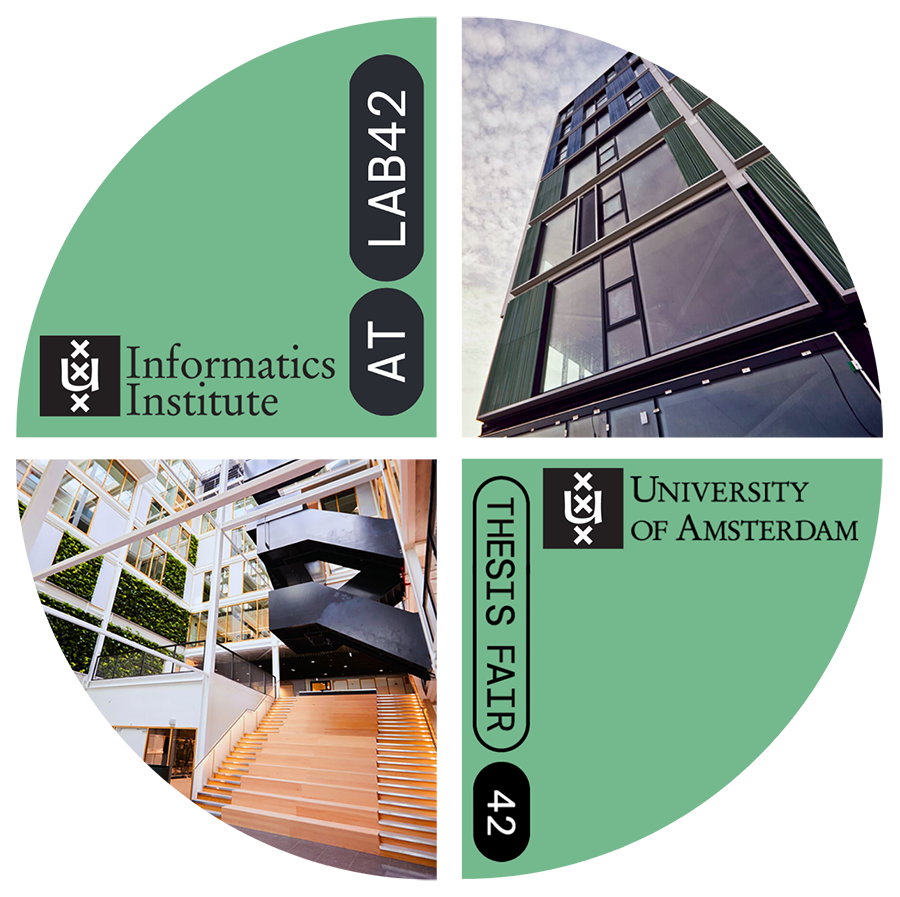
Education
One of the missions of the Informatics Institute is to train talent by high-quality academic education in diverse areas of informatics. Our vision is to form students to tackle the big societal problems of the 21st century, by offering them a solid foundation. With educating successful future professionals and researchers we build a link between society and science.
The 4 bachelors and the 8 masters are respectively embedded in the College of Informatics (CoI) and the Graduate School of Informatics (GSI).
Research
Our research involves complex information systems focusing on collaborative, data driven, computational and intelligent systems in 5 research themes: Artificial Intelligence; Computational Science; Data Science; People, Society and Technology; as well as Systems and Networking.
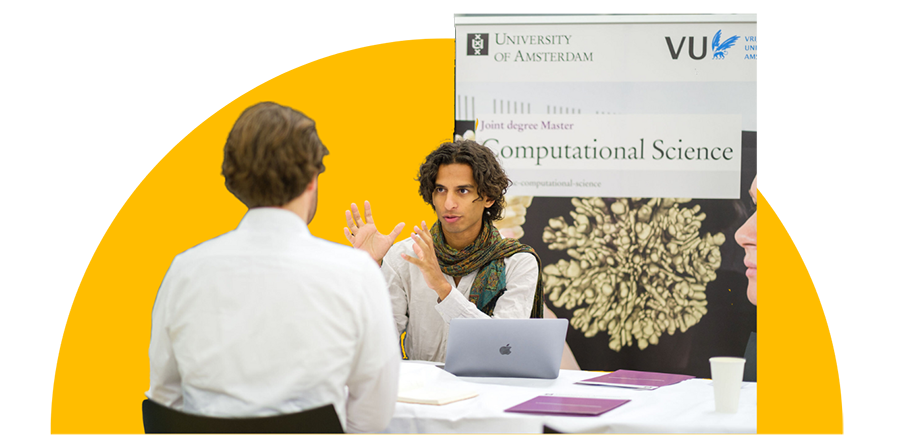
The Amsterdam Machine Learning Lab (AMLab) conducts research in machine learning, artificial intelligence, and its applications to large scale data domains in science and industry. This includes the development of deep generative models, methods for approximate inference, probabilistic programming, Bayesian deep learning, causal inference, reinforcement learning, graph neural networks, and geometric deep learning.
AMLab comprises 7 faculty. Jan-Willem van de Meent, who serves as director, Max Welling, Herke van Hoof, Patrick Forré, Erik Bekkers, Christian Naesseth, and Sara Magliacane. The lab participates in public-private partnerships with industry through the QUvA Lab (with Qualcomm) and the Delta Lab (with Bosch). The lab also engages in cross-disciplinary collaborations through the AI4Science Lab.
The Complex Cyber Infrastructure (CCI) group is part of the Informatics Institute at the University of Amsterdam. CCI’s mission is to advance the trustworthiness of complex computer systems. We focus on decentralized systems with advanced technologies (e.g., cloud, edge, blockchain, data spaces), serving multiple stakeholders with different objectives. Our research aims at improving compliance with defined policies, security & privacy, and environmental sustainability, thus providing a solid foundation for advanced data analytics and artificial intelligence applications. We teach the next generation of computer science professionals, and cooperate with a large ecosystem of organizations. Our focus areas include data exchange systems, normative reasoning, security & privacy, software languages, and responsible software systems.
We live in a highly connected and strongly coupled world, and are surrounded by a large diversity of complex systems. All these systems have one thing in common: they process information. At CSL, we aim to understand this information processing in such dynamic multi-level complex systems. Nature is a Complex System that processes information. Computational Science aims to make the complexity of those systems tractable.
Digital cameras have become ubiquitous in the form of consumer cameras, webcams, mobile phones, and professional cameras. These cameras yield enormous streams of data and provide the means for communication, observation, and interaction. Understanding visual data remains a challenge and it is this challenge addressed by the Computer Vision (CV) group.
The mission of the CV group is to research on core computer vision technologies and in particular color processing, 3D reconstruction, object recognition, and human-behavior analysis. The aim is to provide theories, representation models and computational methods which are essential for image and video understanding. Research ranges from image processing (filtering, feature extraction, reflection modeling, and photometry), invariants (color, descriptors, scene), image understanding (physics‐based, probabilistic), object recognition (classification and detection) to activity recognition with a focus on human‐behavior (eye tracking, facial expression, head pose, age and gender). CV Group contains of 6 faculty, and is led by Prof. dr. Theo Gevers. Arnoud Visser, Shaodi You, Martin Oswald, Sezer Karaoglu, and Dimitris Tzionas serve as tenure-track faculty or affiliated researcher. The lab participates in partnerships with industry through the Delta Lab (with Bosch), and the Atlas Lab (with TomTom).
The DILAB is a Human-Computer Interaction research group within the Informatics Institute at the University of Amsterdam.
Our research bridges the gap between the technology-oriented and market-led formulation of the smart agenda with a sociological and psychological understanding of what people need artificial intelligence to be, and how data science might enhance our societies.
There are broad societal issues around agency, trust, and ethics which must be considered in the context of how data is gathered and used. There is also increasing debate around the appropriate role for sensors, algorithms, etc. in our everyday lives. Fortunately, this is leading to a heightened awareness of the relative roles of artificial and human intelligence, with a focus on technologies that can augment human capacity rather than attempting to emulate it.
The predominant research questions we try to answer are ‘How can we ensure that advances in artificial intelligence and data science lead to concomitant advances in human values, dignity, wellbeing, and flourishing? How can interactive digital technologies address the pressing societal challenges of today, and the ones of the future, in ways which lead to real impact?’
The focus is on ‘impact’. In an inherently multidisciplinary endeavour, the Digital Interactions Lab, as a Human-Computer Interaction Lab, is committed to connecting the realm of technology with reflections, concepts, and knowledge established in various domains of social science. It also connects with people and domain experts to ensure impact.
The IRLab Amsterdam is part of the Informatics Institute of the University of Amsterdam. Our research focuses on information retrieval: technology to connect people to information. We work on search engines, on recommender systems, and on conversational assistants. There is a heavy emphasis on data-driven methods, for understanding content, for analyzing and predicting user behavior, and for make sense of context.
We combine fundamental, experimental and applied research, and we do so using a broad range of data: text, images, structured information. We are involved in a large number of projects with other groups, both within and outside academia. Our research is funded by NWO, KNAW, the EU and through a range of public-private partnerships. We are strong believers of great science with great impact and greatly value an entrepreneurial spirit.
The IRLab grew out of the Information and Language Processing Systems (ILPS) group and was founded on September 1, 2020. We are proud to have a large and diverse team, with people from over 15 countries, bringing a rich spectrum of perspectives on the challenges that we choose to research.
The IRLab Amsterdam is proud to be engaged with a number of ICAI Labs: AIRLab Amsterdam, the Elsevier Discovery Lab, the Mercury Machine Learning Lab, the Police AI Lab, and more to come.
The INtelligent Data Engineering Lab is part of the Informatics Institute of the University of Amsterdam. It investigates intelligent systems that support people in their work with data and information from diverse sources. This includes addressing problems related to the preparation, management, integration and reuse of data.
We perform both applied and fundamental research informed by empirical insights into data science practice. Recent topics of interest include: data management for machine learning, data search, data provenance, information integration, automated knowledge base / knowledge graph construction, and data semantics.
Breaking down language barriers with language technology.
The Language Technology Lab (LTL) is a research group within the Informatics Institute at the University of Amsterdam. LTL focuses on information access from natural language data. Natural language is, simply put, the way humans communicate with each other in speech and text. The group’s unique angle is that they work on language independent technology.
There are thousands of languages in the world. Analysing and translating all those languages in an automated way, would break down language barriers. The predominant question the group tries to answer: How can we represent meaning of texts and how can that be exploited for applications?
LTL’s research themes are strongly motived by concrete applications. Within the research area of multilingual machine translation, the group works on machine translation tools, such as Google Translate, but then in a language-independent way. The second research area revolves around Conversational Systems and Questions Answering. Conversational systems – think of a chatbot or a virtual assistant like Amazon’s Alexa – focus on the conversation between a human and a machine. Question Answering technology focuses specifically on short questions like ‘How hot is the sun?’ and concrete answers like ‘The sun is 27 million degrees Fahrenheit’. The third research area is more theoretical and concentrates on latent instructions. When we speak, there is always an underlying representation that motivates why we say something. But this is not reflected in the data. LTL builds latent models that make educated guesses on these underlying representations based on what they can observe.
At the Multimedia Analystics Lab (MULTIX), we research multimedia analytics by developing AI techniques for getting the richest information possible from the data, visualizations, and interactions surpassing human and machine intelligence. We blend multi-modal data in effective interfaces for applications and social impact in public health, forensics and law enforcement, cultural heritage, and data-driven business.
At Multiscale Networked Systems (MNS) we research the following areas:
- Programmable networks
- We focus on the delivery of secure and sustainable ICT services across multiple domains. Device programmability and virtualization will play in this field an ever-increasing role in designing networks and ICT infrastructures. Our research tackles the new questions that emerge from studying the interplay of these novel capabilities.
- Data centric processing
- Our research investigates an alternative to the current approach to model complex scientific experiments as workflow of dependent tasks, in this approach scientific data is interlinked though data processing transformations which can be discovered and used to create the data processing workflow and not the way around.
- Quality critical distributed computing
- We research the performance and service quality required by applications that have very high business value or social impact on advanced IT infrastructures. We focus on novel programming and control models for quality critical systems on programmable infrastructures such as Clouds, Edges, and SDNs using blockchain and AI.
The Parallel Computing Systems (PCS) group at the University of Amsterdam performs research on the design, programming and run-time management of multi-core and multi-processor computer systems. The modeling, analysis and optimization of the extra-functional aspects of these systems, such as performance, power/energy consumption, thermals, reliability but also the degree of productivity to design and program these systems, play a pivotal role in this work.
QurAI is an interfaculty group embedded in the Faculties of Medicine (Department of Biomedical Engineering and Physics) and Science (Institute of Informatics) of the University of Amsterdam. Our mission is to enhance patient care by designing and enabling leading edge AI technologies in healthcare.
In 2020, after more than 15 years expertise in solving clinical challenges in medical image analysis, specially in the fields of radiology, cardiology, neonatology and ophthalmology, Ivana Išgum and Clarisa Sánchez founded qurAI with the ambition to enable groundbreaking AI methodology in patient care. The interfaculty nature of the group was their first step to close the common conceptual, and even physical, gap between curiosity-driven and use-inspired AI research in healthcare, and to cohere top, fundamental AI research and excellent clinical practice in one group.
QurAI is established to develop, validate and clinically integrate socially responsible AI solutions to solve data analysis challenges encountered in different steps of the patient pathway, from prevention and triage, through diagnosis and decision making, to care delivery and management.
Our aims are:
- Bring fundamental AI research and clinical research closer and facilitate the cross-fertilization of these fields.
- Facilitate interdisciplinary collaboration across UvA to strengthen research and implementation of socially responsible AI in healthcare.
- Educate the next generation of AI developers in healthcare and the next generation of doctors that will use AI.
- Enable responsible use of key resources (data, computational power, algorithms, clinical knowledge, clinical workflows) for the development and translation of healthcare innovations.
SIAS, Socially Intelligent Artificial Systems Group, researches AI systems have fully permeated society and are making positive impact in many ways. However, the widespread use of AI systems also leads to unintended negative effects on people and society, including social inequality and discrimination. The SIAS research group studies how to advance people’s everyday life and society in general through AI research, education and impact. The group engages in incremental trust building and value learning with stakeholders across various scientific disciplines and application domains, and on topics that are relevant both socially and academically.
The SIAS group falls under the People, Society and Technology Theme of the Informatics Institute (IvI) at the Faculty of Science, University of Amsterdam. The group is led by Prof. Sennay Ghebreab.
The Theory of Computer Science (TCS) Group does research on the theoretical foundations of computer science. The aim is to seek greater understanding of fundamental computational techniques and their inherent limitations. The TCS group forms an integral part of a vibrant community of TCS researchers in Amsterdam.
We make sense of video and images with artificial and human intelligence. The lab studies computer vision, deep learning and cognitive science. We are based at the Informatics Institute of the University of Amsterdam.
The VIS Lab embeds four public-private AI labs. QUVA Lab with Qualcomm, Atlas Lab with TomTom, AIM Lab with the Inception Institute of Artificial Intelligence and POP-AART with the Netherlands Cancer Institute and Elekta Oncology Systems. Spin-off’s from the lab include Kepler Vision Technologies and Ellogon.ai.
Organisations’ Frequently Asked Questions
AI Thesis Fair and the Thesis Fair will take place on Friday, 17 October 2025
Here you can find the answers to most questions you may have. Please review the information below before reaching out to us.
The platform will become live for Organisations in Summer 2025
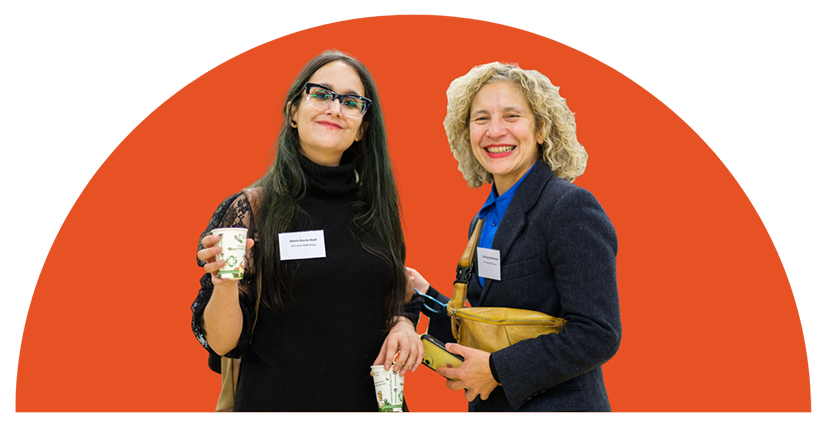
Both the AI Thesis Fair and the General Thesis Fair will be held on the same day at the KIT.
2025/2026 Thesis Fair
Date: Friday, 17 October
Location: Royal Tropical Institute (KIT)
Mauritskade 63, 1092 AD Amsterdam
Day Programme (this is a tentative schedule, actual times may change)
8:30 – 9:00 AI organisations and students register and the organisations set-up their booths
9:15 – 12:15 AI Thesis Fair
12:15 – 12:45 Lunch for AI Thesis Fair participants
12:45 – 13:30 Morning organisations break down booths and leave with AI students. New organisations setup booths and the rest of the students arrive
13:45 – 14:30 Registration for students/organisations for the General Thesis Fair
14:30 – 17:30 General Thesis Fair
17:30 – 18:30 Borrel
There are 3 requirements for participating in the event(s):
- Register your organisation here.
- When submitting your projects you must include a double asterisk, **, in your project name. This will provide a quick visual cue to students that your projects will be represented at the event(s).
- Pay the registration fee by Tuesday, 7 October.
Here is an example of how the project name should look like:

AI Thesis Fair 8:30 – 12:45
MSc Artificial Intelligence
General Thesis Fair 13:45 – 18:30
MSc Computational Science (joint degree with the VU, hosted at UvA)
MSc Computer Science (joint degree with the VU, hosted at the VU)
MSc Information Studies – Data Science Track and Information Systems Track
MSc Logic
MSc Software Engineering
MSc Security and Network Engineering
The UNL (Universities of the Netherlands) internship agreement provides guidance for universities, students, and companies using the national model agreement for internships in academic (WO) education. This model was developed to streamline the creation of internship agreements by offering a legally sound, consensus-based framework, eliminating the frequent need for legal consultation. Its development involved extensive input from businesses, universities, and student representatives. The agreement helps universities fulfill their statutory duty of care toward students, including maintaining academic integrity and ensuring internship-related documents, are auditable and transparent.
The agreement is grounded in Dutch law and tailored to domestic internships, though it can be used by non-European students interning in the Netherlands. It allows room for customized clauses through a “Particulars” section, though deviations from core conditions are limited. Intellectual property (IP) generated during the internship typically belongs to the host company unless the university or student contributes substantially outside the internship scope. Copyright of the final report remains with the student, but sensitive content can be embargoed for 2 to 5 years (or longer in specific sectors) to protect trade secrets.
Careful language has been used to avoid blurring the lines between internship and employment, particularly for tax reasons. Company rules may apply during the internship but must align with the agreement terms, particularly concerning confidentiality. Interns and university staff are held to the same confidentiality standards as company employees. Interns must be adequately supervised, and health insurance requirements are clarified, especially for international students. Lastly, universities, as publicly funded bodies, must ensure that any transfer of knowledge or resources to the private sector adheres to state aid regulations, charging at least cost price for any services rendered.
Please note that the following organisations are exempt from this UNL Internship policy:
- Internal UvA departments and Research Groups
- AUMC and other Dutch academic hospitals
- The Police
- The Netherlands Forensics Institute (NFI)
- The Ministry of Defense
Here are some links that may be of use:
- The official document with all stipulations listed.
- An addendum.
- The official contract.
- Please note that on page 3, Article 16.4 is ticked as “applicable” as per UvA policy.
- The UNL website with all documentation, including Dutch versions.
For any questions please contact internshipagreement-science[at]uva.nl
All project submissions MUST be in English. If the project requires a Dutch-speaking student then you can state that as part of the project requirements.
For a detailed description of the project requirements, please visit here.
Please take note of each MSc programme’s thesis requirements and create your project proposal accordingly. The projects are reviewed and approved by the individual program Thesis Coordinators. Any project that does not adhere to the project requirements will be rejected and you will be required to make any requested adjustments.
Your organisation can submit projects just to the Thesis Matching Platform and not participate in the event(s), this is free. But if your organisation does wish to participate in the event please note that there are 3 requirements for participating in the event(s):
- Register your organisation here.
- When submitting your projects you must include a double asterisk, **, in your project name. This will provide a quick visual cue to students that your projects will be represented at the event(s).
- Pay the registration fee by Tuesday, 7 October.
Here is an example of how the project name should look like:

We have a new platform, the Thesis Matching Platform (TMP). This is a Faculty of Science developed and supported platform and it will eventually be used by all programmes in the Faculty of Science. The GSI and Thesis Fair are piloting it for the 2025/2026 Academic Year.
The new platform’s URL is: https://datanose.uva.nl/m/thesismatching
For External Organisations
For UvA and AUMC
- Logging into the TMP is the same as logging into DataNose. The TMP is hosted on DataNose 2.0 and so the URL is different (datanose.uva.nl will eventually replace the existing datanose.nl). This means you will be required to use the Tiqr 2FA app in order to log in.
- Internal Project Submission Guide
- Add Colleagues Guide
In order to participate in the event(s) you will need to register here as well as add two asterisks, **, into the title of your submitted projects. Like this:

For External Organisations
For UvA and AUMC
Project Considerations
Your organisation can submit projects just to the Thesis Matching Platform and not participate in the event(s), this is free. But if your organisation does wish to participate in the event please note that there are 3 requirements for participating in the event(s):
- Register your organisation here.
- When submitting your projects you must include a double asterisk, **, in your project name. This will provide a quick visual cue to students that your projects will be represented at the event(s).
- Pay the registration fee by Tuesday, 7 October.
Here is an example of how the project name should look like:

Here is a good example of a well-written project proposal.
This is possible and it does not cost money to simply have your projects listed on the Thesis Matching Platform. You will still need an account and follow all of the steps when uploading a project.
Your uploaded projects will still need to adhere to the Project Requirements for each program and will be reviewed and approved/rejected by our academic Thesis Coordinators.
If your organisation is not participating in one of the events then do not add a double asterisk, **, to your project name. Only projects with ** in the name will be represented at the event.
An Open Project is when you wish to leave the topic free to be discussed between you and a student. Or you wish to see what a student would like to propose to you. This allows for some creativity.
To upload one, follow the same instructions under “How do I upload a project proposal?” If it is an Open Project for a specific type of student, please title it “Open Project AI” or Open Project Software Engineering”; please ensure to choose the correct corresponding programme.
- Log in to the Thesis Matching Platform.
- Check that you are on your organisation’s profile page.
- To add your colleagues to your organisation’s account, just click on the red “+ Add Representative” button on the right-hand banner. They will then receive the automated email to create their own eduID on SURFconext.
There are 3 requirements for participating in the event(s):
- Register your organisation here.
- When submitting your projects you must include a double asterisk, **, in your project name. This will provide a quick visual cue to students that your projects will be represented at the event(s). Project submissions are due Friday, 29 August 2025
- Pay the registration fee by Tuesday, 7 October.
Here is an example of how the project name should look like:

The fees for each Thesis Fair are tiered based upon the type of organisation. When you register, we will assign the applicable tier. Please note that you cannot participate in the Fair without payment first.
€200 (startups, SMEs, government organisations, and non-profits)
€700 (medium/large companies)
€1500 (large companies)
If you do not wish to attend the event and instead only have your projects listed on the Project Marketplace, this is possible and it is free. Please note that these projects still need to be approved by the Thesis Coordinators in order to be listed.
The Thesis Fair takes place on Friday, 17 October 2025.
Registration is open, with projects due on Friday, 29 August 2025.
The registration fee is due on Tuesday, 7 October.
Students will finish voting for projects by Thursday, 25 September.
You will need to respond to our request with the number of attending representatives NO LATER THAN Wednesday, 1 October.
Your organisation will be assigned a booth, this includes a set number of tables/chairs, plugs, and, upon request, a poster board for you to pin materials to. The size of your booth will be determined by the Thesis Fair Team and is based upon the size of your organisation, how popular your projects are, and how much space is available. Both events will have the same format with the students divided into 3 groups and the venue divided into 3 sections. Each group of students will have 1 hour in each section, giving ample time for them to meet with the organisations in each section for a total of 3 rounds.
If you join us for the full day, a single registration fee covers your participation. However, if you prefer to attend only the morning session with our AI students or solely the afternoon session with other GSI students, please note that the fee remains unchanged.
Day Programme
8:30 – 9:00 AI organisations set-up their booths
8:30 AI students arrive
9:15 – 12:15 AI Thesis Fair
12:15 – 12:45 Lunch for AI Thesis Fair participants
12:45 – 13:45 Morning organisations break down booths and leave with AI students. New organisations setup booths and the rest of the students arrive
13:45 – 14:30 Student and new organisation registration
14:30 – 17:30 General Thesis Fair
17:30 – 18:30 Borrel
This depends upon the programme the student is in, your capacity, and internship negotiations with the student. The student may have classes that they need to complete and therefore may not be able to start their internship full-time until their Thesis course officially starts.
MSc Artificial Intelligence: 6 months, typically starting in January. An 8 month thesis is possible with approval.
MSc Computational Science: 7-8 months, typically starting in November.
MSc Computer Science: 5 months, typically starting in February.
MSc Information Studies – Data Science Track and Information Systems Track: 6 months in total, the first 3 months are part-time working on their thesis and still taking classes, then in April they start their thesis full-time for 3 more months.
MSc Logic: 5 months, typically starting in January/February.
MSc Software Engineering: 3-5 months, typically starting in April.
MSc Security and Network Engineering: 3 months, typically starting in April.
You can find the exact length of time per programme and extra information in the Project Guidelines here.
During the event your representatives inform the students on what the next steps are. Whether it is contact via email, already setting up appointments to meet later, or for students to come for a presentation at your organisation at a later date. The format of follow-up is different for every organisation.
Matching/recruiting the students is between you and the students only. The event itself is a meeting point to help ascertain which students are actively interested and qualified for your project(s) and organisation.
Project Guidelines
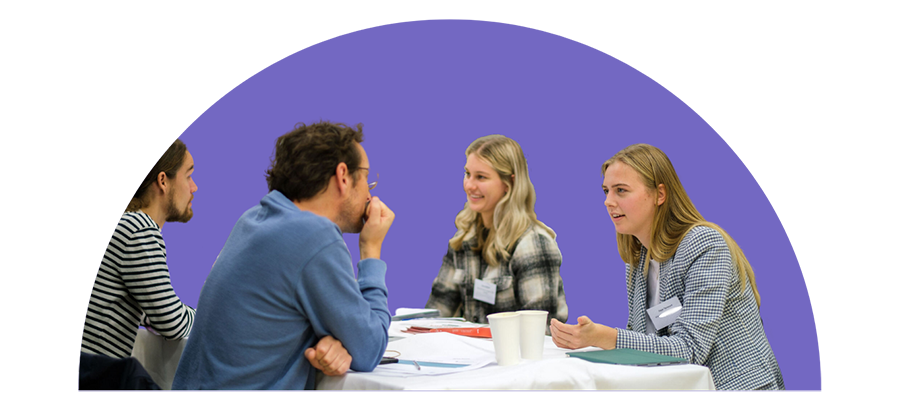
Please note that all submitted projects will undergo a two-step review process by Thesis Fair staff and academics from each programme. Projects may be rejected or may require reworking. You may download the project requirements here.
The UNL (Universities of the Netherlands) internship agreement provides guidance for universities, students, and companies using the national model agreement for internships in academic (WO) education. This model was developed to streamline the creation of internship agreements by offering a legally sound, consensus-based framework, eliminating the frequent need for legal consultation. Its development involved extensive input from businesses, universities, and student representatives. The agreement helps universities fulfill their statutory duty of care toward students, including maintaining academic integrity and ensuring internship-related documents, are auditable and transparent.
For any questions please contact internshipagreement-science[at]uva.nl
New Policy
The UNL (Universities of the Netherlands) internship agreement provides guidance for universities, students, and companies using the national model agreement for internships in academic (WO) education. This model was developed to streamline the creation of internship agreements by offering a legally sound, consensus-based framework, eliminating the frequent need for legal consultation. Its development involved extensive input from businesses, universities, and student representatives. The agreement helps universities fulfill their statutory duty of care toward students, including maintaining academic integrity and ensuring internship-related documents, are auditable and transparent.
The agreement is grounded in Dutch law and tailored to domestic internships, though it can be used by non-European students interning in the Netherlands. It allows room for customized clauses through a “Particulars” section, though deviations from core conditions are limited. Intellectual property (IP) generated during the internship typically belongs to the host company unless the university or student contributes substantially outside the internship scope. Copyright of the final report remains with the student, but sensitive content can be embargoed for 2 to 5 years (or longer in specific sectors) to protect trade secrets.
Careful language has been used to avoid blurring the lines between internship and employment, particularly for tax reasons. Company rules may apply during the internship but must align with the agreement terms, particularly concerning confidentiality. Interns and university staff are held to the same confidentiality standards as company employees. Interns must be adequately supervised, and health insurance requirements are clarified, especially for international students. Lastly, universities, as publicly funded bodies, must ensure that any transfer of knowledge or resources to the private sector adheres to state aid regulations, charging at least cost price for any services rendered.
Please note that the following organisations are exempt from this UNL Internship policy:
- Internal UvA departments and Research Groups
- AUMC and other Dutch academic hospitals
- The Police
- The Netherlands Forensics Institute (NFI)
- The Ministry of Defense
Here are some links that may be of use:
- The official document with all stipulations listed.
- An addendum.
- The official contract.
- Please note that on page 3, Article 16.4 is ticked as “applicable” as per UvA policy.
- The UNL website with all documentation, including Dutch versions.
For any questions please contact internshipagreement-science[at]uva.nl
Project requirements
The submitted project must be written in English. If the project requires a Dutch speaker please state that in the project description.
Thesis projects for the AI Master should focus on research. Hence the main project requirement is a clear research question the student can answer during the six months of the thesis.
The goal of the thesis
The high-level goal of the thesis is for the student to demonstrate that they are capable to formulate a clear research question; make a plan to answer it within a given timeframe; and answer it convincingly: a good thesis is actionable and could be used as a base for future research. As such, both “positive” and “negative” results are valued, granted they are motivated and come from a clear and unambiguous protocol. The final grade of the thesis project is mostly determined by the final manuscript: its scientific content, but also presentation, readability are all assessed. Adherence to deadlines and student attitude is also taken into account.
Examples of successful past thesis projects
Successful examples:
- Greedy InfoMax for Self-Supervised Representation Learning
- Deep Learning Methods for Deconvolution in Radio Astronomy
- Deep Reinforcement Learning for Coordination in Traffic Light Control
What does a good project proposal look like?
A good proposal includes a clear and sufficiently novel research question, an interesting research problem, and relevant context (which includes motivation for the research question and optional references). Notably, the question should be able to be answered with a ‘yes’/’no’/’how much’. Simply attempting to solve a given problem is too broad and not clear enough. But testing if given method can perform well for some task is a better framing of the question. Negative results should be a possible outcome, provided they help to build knowledge and understanding of the task and problem
What does an MSc student from your programme look like?
An AI MSc student undertaking their thesis will be a 2nd year master’s student. The student has a solid foundation in machine learning theory and application, with specialties ranging from computer vision and natural language processing to reinforcement learning and traditional AI.
By completing the project, a student will be able to:
- Analyse the scientific literature most relevant to the thesis topic, and develop a clear research plan based on said literature and own knowledge.
- Demonstrate the ability to select and apply a broad range of methods and techniques relevant to the task.
- Assess the results quantitatively and/or qualitatively (whichever is applicable), thoroughly and unambiguously.
- Summarise the work performed and its findings, while remaining accessible to a broader, nonexpert audience.
- Discuss the high-level impact of the work, both within its own field, and with respect to the larger societal context.
Main areas of research
- Machine learning
- Computer vision
- Natural language processing
- Reinforcement learning
- AI
- Information retrieval
Timeline of the thesis
The typical student will start their thesis in January and last typically for 6 months (8 months theses are possible but require approval of the board of examiners for each student). A rough expected timeline is as follows:
1 month: developing and understanding
2-4 months for developing method
1-2 months: finalising
1 month: polishing the writing
Scope of the project
A thesis manuscript should contain relevant analyses, methods, and experiments to support the research question.
Project requirements
The submitted project must be written in English. If the project requires a Dutch speaker please state that in the project description. The graduate in Computational Science has a thorough knowledge of modelling and simulation of complex systems, computational methods and techniques, and the application of computational methodologies in application fields (ranging from e.g. physics or biology to medical sciences or engineered systems to complex social systems).
The computational science thesis should include one or more of the following broad aspects:
- Developing computational models, that implement causal mechanisms to understand and predict the behaviour of any system. This could be any system such as social, technical, engineered, biological, physical etc. or
- Computational or mathematical techniques to analyze the behaviour of such models. These include strategies for sensitivity analysis, calibration and validation of models. or
- Developing computing techniques (e.g. distributed algorithms) to enable large scale, computational models.
The goal of the thesis
The thesis aims to enable the student to develop more in-depth knowledge, understanding, capabilities, and attitudes in the study programme. A Master of Computational Science thesis should emphasize the scientific and modelling (computational ) aspects of the specific system under investigation. The thesis’s overall goal is to display the knowledge and capability required for independent work as a computational scientist.
Computational models are intended to implement causal processes in a single mechanism, which sets them apart from traditional data analysis techniques (such as machine learning) which are applied directly to available data. Without incorporating the same causal mechanisms either explicitly or implicitly (on which research indeed is taking place), in general, data analysis should be restricted to make inferences or predictions ‘within the data (e.g., clustering, regression, interpolation) or perhaps ‘near extrapolation’ (hypothetical scenarios which are still close to that of the data). The outcome of ‘far extrapolation’, however, requires incorporating the relevant causal processes (since their validity extends beyond any data set), which is by definition the goal of computational modelling.
This distinction can also be seen by comparing the ‘inductive capability’ of the learning algorithms (from past data, one can identify patterns) with the deductive capability of computational (mechanistic) models.
Examples of successful past thesis projects
- Understanding biomass dynamics in semi-arid ecosystems A computational means to an organic end.
- Causal Discovery from Spontaneous Targeted Interventions
- Effects of internal viscosity contrasts in a blood flow model based on immersed boundary lattice Boltzmann methods
- Optimizing Resource Allocation in Socio-economic Systems with the Minority Game: A Case Study on Electric Cars
- Rethinking Global Sensitivity Analysis for Agent-Based Models: from Scalar Outputs to Stochastic Trajectories
- Complex Systems Analysis of Multi-Level Poverty Traps
- Modelling Interstellar Conflict
What does a good project proposal look like?
- Clearly highlight the novelty of the proposed research and how it builds on the current state-of-art?
- Clearly highlights the significance of the research. Why now?
- Clearly highlight the data availability (if applicable) and how data will be accessed.
- Computational techniques that will be applied in the research with a focus on mechanistic understanding and interventions.
- Planned research outcome
What does an MSc student from your programme look like?
The programme is oriented to prepare students for entry into a PhD programme in Computational Science or related disciplines, or into research positions outside academia. This is mainly triggered by the strong need in science and society for computationally trained researchers, in academia, industry and business.
A number of core and constrained courses (in the first year) help develop students with an independent and scientific mindset.
- A CLS student is an expert in modelling and simulation as the third pillar of science and is capable of applying abstract models to understand societal questions. Courses such as AgentBased Modelling and Complex System Simulation (in addition to teaching knowledge and skills) ask students to develop their own research questions and models by themselves on a diverse set of topics.
- Students can apply models to Implement and study interventions and what-if scenarios to improve/optimize with respect to a practical application.
- The student has basic knowledge about different techniques for modelling biochemical reactions, metabolic pathways, regulatory networks and cells (Boolean networks, coupled with Updated June 2025 7 ordinary differential equations, examples of partial differential equations, optimization techniques, and cell- based models)
- Students obtain insight into distributed algorithms – concurrency concepts and are offered a bird’s-eye view of a wide range of algorithms for basic and important challenges in distributed systems
By completing the project, a student will be able to:
- Develop a robust understanding of modeling and simulation as the third pillar of science.
- Independently formulate and analyze abstract models to tackle societal, scientific, and industrial challenges.
- Design and conduct research projects that involve defining research questions and creating models.
- Develop an independent and scientific mindset to pursue further academic or industrial research.
- Build skills for creating novel models, designing interventions, and contributing to fields like computational science, data science, systems biology, and distributed computing. These competencies will prepare students for advanced research roles in academia, industry, or government organizations and enable the
Main areas of research
● Theory of complex systems
● Urban complexity
● Computational Biology
● Computational Finance
A rough timeline of the thesis
7 to 8 months, Typically starting from November.
Scope of the project
The projects are not limited to any systems and context as long as they adhere to the requirements.
Project requirements
The submitted project must be written in English. If the project requires a Dutch speaker please state that in the project description. The project has the required academic level and content. The project must enable the student to learn to conduct independent research under supervision, on a research question that has been clearly defined in advance. A student on a placement may not carry out simply routine work. The project should be feasible.
The proposal must include: the problem statement, the research question(s), a short description of the proposed method, and a planning that also states the frequency the student will meet with the daily supervisor/main supervisor.
The goal of the thesis
A thesis and/or placement assignment is an important part of the Master programmes and involves many different aspects, such as theoretical preparation, practical execution, literature survey, report and thesis writing, oral presentation, and participation in the scientific activities of a research department. The Master Project is the programme component where scientific and professional skills are trained most extensively. The Master Project always involves an element of originality or creativity. A student will use all the knowledge acquired during the studies to perform a design task or to contribute to solving a scientific problem in the computer science field.
Example of successful past thesis projects
- Enhancing and Assessing a Prefetching Technique for Android apps
- AndroidTimeMachine: A Graph-based Dataset of Commit History of Real-World Android Apps
- Parallel Detection of Strongly Connected Components with Prioritised Vertices
- A Scalable and Hybrid Cloud Framework for Evaluating Streams of Sensor Data in Real-Time
- Dangless MAlloc: Safe Dangling Pointer Errors
- Detecting information leaks using kernel-level multi-variant execution
- A Learning-based Approach for Stream Scheduling in Multipath-QUIC
- Adaptive Latency Control for Edge Video Stream Analytics
- Automatic test case generation based on properties as scenarios for Axini Modeling Language
By completing the project, a student will be able to:
- Identify a scientific problem in a computer science-related field
- Formulate one or more research questions to guide the project
- Design a solution to answer the research question(s) in a limited period of time, implement the solution and critically analyze the results
- Collaborate with supervisors and other students and communicate (both orally and in writing) about their progress, the results, and the lessons learned.
Main areas of research
- Artificial Intelligence
- Bioinformatics
- Computer Systems
- High Performance Distributed Computing
- Systems and Network Security
- Massivizing Computer Systems
- Foundational and Experimental Security
- Sustainable Digital Society
- Software and Sustainability
- User Centric Data Science
- Decentralized Information Society Engineering
- Theoretical Computer Science
Scope of the project
The projects are not limited to any systems and context as long as they adhere to the requirements. A thesis manuscript should contain relevant analyses, methods, and experiments to support the research question
What does an MSc student from your programme look like?
The MSc student undertaking the master project will be a second year master’s student. Student should ideally have completed the 90% of the course work in order to have a solid foundation of the theory, practical and application skills of computer science field.
A rough timeline of the thesis
The thesis should be concluded within 5 months with the majority of the students starting in February.
Course Content
The Master Project is the programme component where scientific and professional skills are trained most extensively. The Master Project always involves an element of originality or creativity. A student will use all the knowledge acquired during the studies to perform a design task or to contribute to solving a scientific problem in the computer science field. The project can take place either inside the Department of Computer Science of the VU or the Informatics Institute of the University of Amsterdam or as an internship in a company. In the case of an internship, supervision will be in cooperation with a daily supervisor at the company. In both cases, a detailed project proposal must be written and approved in advance by a staff member, who in this way agrees to act as project’s main supervisor. The proposal must include: the problem statement, the research question(s), a short description of the proposed method, and a planning that also states the frequency the student will meet with the daily supervisor/main supervisor. The main supervisor needs to find a second reader for the thesis, who must also be a staff member.
Additional Information Teaching Methods
The project can take place either inside the Department of Computer Science of the VU or the Informatics Institute of the University of Amsterdam or as an internship in a company. In the case of an internship, supervision will be in cooperation with a daily supervisor at the company. In both cases, a detailed project proposal must be written and approved in advance by a staff member, who in this way agrees to act as project’s main supervisor. In most cases, the Master project is performed as an individual project, under close and regular supervision by the main supervisor and the daily supervisor. In exceptional and well-argued cases, students may execute projects in small groups, when the project lends itself for. The project starts when the project proposal has been signed by both students and supervisors. The student plans regular meetings with the daily supervisor and the main supervisor to discuss the progress. Towards the end of the project, the student gives a presentation in the research group of the supervisor or at the company where the internship took place. The student submits their thesis which will be evaluated by the main supervisor and the second reader
The MSc Information Studies has two tracks, namely Data Science (DS) and Information Systems (IS). Both investigate the use of particular technology with respect to the origination, collection, classification, analysis, sensemaking, manipulation, storage, retrieval and dissemination of information.
In this context, students in the DS track focus on data, related structures and their algorithmic processing, for the generation of information, and the maintenance of data and information, mainly using machine learning approaches.
Students in the IS track focus on cognitive and social implications for the structures within and the use of information systems. Here the relation between data, information and knowledge is investigated on a systems level, including the design of datasets, interaction environments and underlying system architectures.
Project requirements
The submitted project must be written in English. If the project requires a Dutch speaker please state that in the project description.
The student has to have finished all courses from the 4 blocks of the programme.
The research project’s objective is to give the student an opportunity to acquire practical experience in quantitative and qualitative scientific research methods and to learn to work independently.
The project requires an implementation that can be validated.
A typical Data Science thesis requires hand-labelled data, sufficient complexity going beyond simple approaches such as linear regression and a proper evaluation setup (cross-validation, using more than 1 dataset, train/test, et cetera). For an Information Systems thesis, it is required to have a proper validation for a quantitative or qualitative study. When interviews are used to get a requirement set, the set must be validated and this will normally be done by means of a design (interface, small algorithmic test, outline of a test framework, et cetera).
A master thesis is defined as “an individually written record of the student’s performed original research or design of a scientific nature”. It is an original, independent piece of work especially composed for this occasion containing the creative ideas of the student. Claims, hypotheses, policy recommendations and design choices need to be supported with arguments based on existing theory or empirical evidence.
The master thesis cannot consist of copied resources (internet, books, and journals), unless properly quoted, and the material has not already been submitted elsewhere (other courses, study programmes, universities) with the aim to receive study credits for this. The master thesis can, however, elaborate on previously submitted work, as long as it is clear which contribution of the student has been submitted for which study programme component.
The goal of the thesis
The focus of the thesis research will be the scientific study of a problem-oriented toward actual research themes in academia and society. The thesis project provides students with first-hand experience in working with established scientists or industry experts for a prolonged period of time.
The learning objectives of the research project comprise, that after completion of the thesis project, the student:
- is able to formulate a clear research question in the field of information studies and design a plan to answer that question
- can show state‐of‐the‐art knowledge in the area of the research project based on the relevant literature by applying in a practical situation
- is able to process the research data and to critically judge the obtained results in relation to the goals and the line of research of which the research project is part
- is able to describe and critically discuss the above activities in a written report, in which the methodology is accounted for and the original phrasing is substantiated
- is able to present and discuss the results to a scientific and non-scientific audience
- is able to function in a professional environment.
Examples of successful past thesis projects
- Efficient Image Similarity Clustering within Apple Orchards on Edge Devices
- Echocardiographic Clustering by Machine Learning in Children with Early Surgically Corrected Congenital Heart Disease
- End-to-End Learning on Multi-Edge Graphs with Graph Convolutional Networks
- Improving the Precision of the HyperLogLog Algorithm by Introducing a Bias
- A Business Value Perspective on Metadata Management
- A Requirements-Driven Redesign of a Terminology Maintenance Process in the Netherlands
- Carsharing: panacea or everlasting promise: Simulating the effect of car sharing policies on the modal split in Amsterdam
What does an MSc student from your programme look like?
The students have good analytical skills regarding problem identification. They can identify potential solutions to the problem and then find in this solution space the answer that best addresses the problem.
Main areas of research
- Machine Learning
- NLP
- Media analysis
- Data analytics
- HCI
As the program is interdisciplinary the students have a broad variety of domains they are knowledgeable in.
A rough timeline of the thesis
The project runs in two parts – a 3-month thesis design (part-time) and a 3-month project (full-time). The usual start date of the actual thesis project is the 1st of April to the 30th of June).
Scope of the project
The student has addressed a feasible problem through a research question that can be answered through quantitative or qualitative methods. As the project time is fixed to 3 months the problem cannot be complex and might address a smaller problem (i.e. the comparison of two machine learning approaches to identify the applicability of one as superior.).
Project requirements
The submitted project must be written in English. If the project requires a Dutch speaker please state that in the project description.
30EC of work, including the writing of the thesis.
The goal of the thesis
The thesis is a report on a substantial piece of scientific work, usually including a significant amount of original research that clearly demonstrates the student’s capacity to independently conduct research in an interdisciplinary environment.
Examples of successful past thesis projects
- Communicate and Vote: Collective Truth-tracking in Networks
- The Classicality of Epistemic Multilateral Logic
- A Compositional Analysis of Dependence Statements
- Hyperintensional Logics for Evidence, Knowledge and Belief
- Algebraic models of type theory
What does a good project proposal look like? What do you want to see included?
To be decided case by case.
What does an MSc student from your programme look like?
Mainly formal-theoretical research skills, background in the theoretical sciences like, e.g., Theoretical Computer Science, Theoretical Linguistics, Mathematics and Philosophy.
Main areas of research
● Theoretical sciences such as:
● Theoretical Computer Science
● Theoretical Linguistics
● Mathematics
● Philosophy
A rough timeline of the thesis
The whole thesis amounts to roughly 5 months of work.
Scope of the project
Depends on the project.
Project requirements
The submitted project must be written in English. If the project requires a Dutch speaker please state that in the project description.
The project requires scientific research contributions. The project should be a mix of theory and practice.
The goal of the thesis
The student should aim to master the scientific research process.
Examples of successful past thesis projects
What does a good project proposal look like? What do you want to see included?
A clear description of the dataset/infrastructure/lab-like environment/real-life case/application that the company can provide the student access to.
What does an MSc student from your programme look like?
The students from MSc SE are quite heterogenous: different countries, and different previous education; one thing they have in common: software is their second nature.
Main areas of research
- Software engineering
- Software testing
- Software evolution
- Model-based design
- DevOps
- Requirements engineering
- Software process
- Microservices
- Programming languages
- Cyber-physical systems
- MLOps
- DataOps
- DApps
- Data engineering
A rough timeline of the thesis
1 month thesis proposal, 3-5 months thesis implementation
Scope of the project
Ideally, publishable research, at least at a workshop level
Important information
We work a lot of the time on co-designing the research proposals. We do not expect external organisations to be able to formulate scientific research questions. But we always find very interesting scientific research problems that come from submitted projects that can be formulated into scientific research questions suitable for our students. So, for SE, the companies are lab-like environments where our students conduct real-life experiments. This is extremely valuable and makes our program attractive and high standard. This means however a lot of work in the weeks after the Thesis Fair when the thesis coordinator sits down with students and helps them identify the research gap in these industry projects.
Of course, this is mostly not the case with projects proposed by our former students that are now working in various companies. They already know what we look for in a project and how to formulate scientific research questions.
Project requirements
The project requires novel scientific research contributions. The project should combine theory and practice. The submitted project must be written in English. If the project requires a Dutch speaker please state that in the project description. The thesis amounts to 18EC of work, including the writing of the thesis, i.e. the rough equivalent of 3-month full-time work.
The goal of the thesis
Through the thesis, the student should aim to master the scientific research process. They should formulate clear research questions, understand and improve the state-of-the-art in a particular field and critically reflect upon their results. During the thesis, the student should demonstrate independence and the ability to function in a professional setting. The thesis culminates in a manuscript and a scientific presentation. By completing the project, the student will be able to produce an innovative manuscript in the academic field of Computer Networks and/or Cybersecurity and present their findings to a specialized audience.
Examples of successful past thesis projects
- Exploring Programmable Network Techniques for Data Plane Optimization
- Automated Machine Learning for power-based Side-Channel Analysis
- Elastic data services for time critical distributed workflows
- Ethereum Smart Contract Fuzz Testing
- High-performance implementations of cryptographic primitives in RISC-V
- Building an open-source, flexible, large-scale static code analyzer
- Security of IoT communication protocols on the AWS platform
- Assessing data remnants in modern smartphones after factory reset
- TCP-Prague evaluation and enhancement
- Persistent Fault Analysis: attacks and countermeasures
- Future tooling and cyber defense strategy for ICS
What does a good project proposal look like? What do you want to see included?
The proposal must include a solid and new research question, and a relevant context and motivation, coupled with existing academic references. The proposal should have clear description of the dataset/infrastructure/lab-like environment/real-life case/application that the company or organization can provide to the student.
What does an MSc student from your programme look like?
All SNE students (Dutch and international) have been accepted into the MSc programme after an intake exam, to ensure that they are proficient with standard networking protocols (TCP/IP stack), Linux console/environments, Python coding, basic mathematics as well as reading/writing/reasoning skills. Their past education is often a BSc in Computer Science (or related degree) from either University (WO) or from University of Applied Sciences (HBO). Several SNE students have past work experience in the ICT field. All SNE students are very keen on delving deep into the technical details of a particular problem/topic and deploying/testing it in real-world infrastructure
Main areas of research
- Network/protocol security
- Software security, exploits, secure coding
- Penetration testing
- Digital forensics
- Intrusion/anomaly detection systems
- Applied cryptography, implementations, physical attacks
- Any other related cybersecurity topics
- Sustainable Cloud Computing
- Cloud FinOps: Cost-Optimization in Cloud DevOps
- Virtualization and Resource Provisioning
- Intelligent Network Resource Allocation
- Machine Learning -based Network Optimization & Management
- 6G Networks
- Any other related computer network topics
A rough timeline of the thesis
3 months of full-time work
Scope of the project
A thesis manuscript should contain relevant analyses, methods, and experiments to support the research question. The work should, ideally, lead to publishable research.
Important information
Every SNE thesis is carried out in collaboration with an academic supervisor (UvA staff member) that co-designs the research proposals/questions and assists the student in solving the real-world problems posed by the industry
Student Frequently Asked Questions

Here you can find the answers to most questions you may have. Please review the information below before reaching out to us.
The platform will be live for students in September 2025
AI Thesis Fair – Morning of Friday, 17 October
This event is for UvA MSc AI YEAR 2+ ONLY
Student Registration: 8:30 – 9:00
Round 1: 9:15 – 10:15
Round 2: 10:15 – 11:15
Round 3: 11:15 – 12:15
Lunch: 12:15 – 12:45
Event Ends: 12:45
Location: Royal Tropical Institute (KIT)
Mauritskade 63, 1092 AD Amsterdam
Important Deadlines
AI Thesis Fair Participating Organisations
AI Thesis Fair event RSVP due: Thursday, 25 September
Project Voting: Tuesday, 16 September – Thursday. 25 September
The Thesis Fair is an opportunity for students to meet with organisations and discuss their offered projects with the hope that you will match with one of them.
Both the AI Thesis Fair (AITF) and the general Thesis Fair (TF) will take place on the same day, Friday, 17 October. Please note that the AI Thesis Fair is only for UvA MSc AI students in their second year.
In order to participate in the Fair you must vote for projects on the DataNose Thesis Matching Platform (TMP). Voting will not only assist you with figuring out which projects are of interest to you, they will also provide the organisations with the number of students interested in their projects. During the Information Session you will receive important information on how to vote on projects, meeting etiquette, CV tips, how to use the new online event platform, etc.
Only UvA students starting their thesis in 2025/2026 in the following programmes may participate in the Thesis Fair:
- MSc Artificial Intelligence (Year 2+)
- MSc Computational Science (Year 2+)
- MSc Computer Science
- MSc Information Studies (Data Science and Information Systems tracks)
- MSc Logic
- MSc Software Engineering
- MSc Security and Network Engineering
Students must vote for projects, IF YOU DO NOT VOTE FOR PROJECTS YOU WILL NOT BE ALLOWED TO ATTEND. Voting and more information will be presented at the Information Sessions. The Information Sessions are visible on your DataNose schedule.
Only MSc Computer Science students from the VU are welcome to participate. These events are not for VU MSc AI students.
NO you cannot attend both Fairs as projects presented at each Fair are specific for your MSc program. Additionally external organisations will be looking for students from the programs described by the event.
The Thesis Matching Platform (TMP) will be available for students in September.
For any questions regarding the Thesis Fairs please send an email to thesisfair-IvI(at)uva.nl.
You will need to contact your Thesis Coordinator. Each program has a specific page or location (website or Canvas) where the thesis information can be found. For MSc AI you can visit the AI Thesis student website first. If you cannot find your answers there, then contact mscAIthesis-GSI(at)uva.nl. For MSc IS you can visit the IS Thesis student website. The Thesis Coordinators for the rest of the programmes can answer your questions:
MSc Artificial Intelligence: Hoel Kervadec at mscaithesis-gsi[at]uva.nl
MSc Computational Science: Debraj Roy
MSc Computer Science: Shahab Ud Din (VU)
MSc Logic: Maria Aloni
MSc Information Studies – Data Science Track: Maarten Marx
MSc Information Studies – Information Systems: Frank Nack
MSc Software Engineering: Martin Bor
MSc Security and Network Engineering: Kostas Papagiannopoulos
Here are the main differences between an internal and external project:
- Internal:
- Internal projects are from our own researchers in our Research Groups. This means that your Academic Supervisor is already decided and you do not need to search for one.
- You will work directly towards contributing towards ongoing research within the university.
- This is not an internship experience, more academic and less industry applicable. Sometimes there are projects with a researcher that is more industry based as some of our researchers are closely tied to companies. The project descriptions will make it clear if this is the case.
- It is a very good idea to take an internal project if you are interested in going for a PhD, as you will most likely be working closely with researchers, postdocs and PhDs.
- No stipends.
- Level of knowledge of the supervisors will be more in depth and these are research projects that the researchers are dedicated their lives to (it is their own research).
- External:
- These are more of an internship/experience style project.
- You have to deliver a thesis but will also have to navigate the professional world (work environment, colleagues, office life, etc.).
- You will have industry networking opportunities and hands-on professional experience.
- There is a potential monthly stipend (this depends upon the organisation and is not guaranteed).
- You will not only be working on your thesis but doing work for the external organisation.
This will be presented in the Information Sessions in September.
NO you cannot attend if you did not vote. You need to RSVP for Fair and vote for projects. Please see the deadlines above at the top of this page.
Please have your CV complete and uploaded to the Platform. In order to prepare for the Thesis Fair, we recommend that you do the following:
- Treat each meeting/discussion like a job interview and be prepared to discuss the projects and research areas.
- Wear professional clothes and have a clean/tidy appearance.
- Prepare questions and do your research for each organisation you with to meet with – know what the organisation does and their mission.
- Maintain eye contact if possible.
- Be confident but not cocky, listen to their questions and be sure to answer them.
- Be respectful. Do not burn any bridges!
- Tell them which programme you are in and how long your thesis is, they will need to know how long they will host you. This is not applicable for our MSc AI students as all attending organisations in the morning will know these details.
Here is what you should do during the meetings:
- Introduce yourself and state when you would begin and for how long.
- Refer to the representative by name.
- Take notes and create questions referring to what the representative has said.
- Ask your prepared questions and ask open questions.
- Check that your ideas and assumptions of the organisation are correct.
- Check that your ideas and interpretations of the project(s) are correct.
- Agree upon further contact and method of contact.
BASIC INFORMATION
- Clear photo of your face (this helps the representatives to remember you from your meeting)
- First and surname
- Github
- Website
- Mobile number
- Address
- Programme name and number of months your thesis will last.
INCLUDE THE FOLLOWING DESCRIPTIONS:
- Profile: Describe your skills, expertise and ambition in 2-3 sentences each
- Education: Which schools you have attended
- Work experience: Short sentences with job description and competencies
- Chosen set of courses and research areas of interest
- Internships and volunteering
The UNL (Universities of the Netherlands) internship agreement provides guidance for universities, students, and companies using the national model agreement for internships in academic (WO) education. This model was developed to streamline the creation of internship agreements by offering a legally sound, consensus-based framework, eliminating the frequent need for legal consultation. Its development involved extensive input from businesses, universities, and student representatives. The agreement helps universities fulfill their statutory duty of care toward students, including maintaining academic integrity and ensuring internship-related documents, are auditable and transparent.
The agreement is grounded in Dutch law and tailored to domestic internships, though it can be used by non-European students interning in the Netherlands. It allows room for customized clauses through a “Particulars” section, though deviations from core conditions are limited. Intellectual property (IP) generated during the internship typically belongs to the host company unless the university or student contributes substantially outside the internship scope. Copyright of the final report remains with the student, but sensitive content can be embargoed for 2 to 5 years (or longer in specific sectors) to protect trade secrets.
Careful language has been used to avoid blurring the lines between internship and employment, particularly for tax reasons. Company rules may apply during the internship but must align with the agreement terms, particularly concerning confidentiality. Interns and university staff are held to the same confidentiality standards as company employees. Interns must be adequately supervised, and health insurance requirements are clarified, especially for international students. Lastly, universities, as publicly funded bodies, must ensure that any transfer of knowledge or resources to the private sector adheres to state aid regulations, charging at least cost price for any services rendered.
Please note that the following organisations are exempt from this UNL Internship policy:
- Internal UvA departments and Research Groups
- AUMC and other Dutch academic hospitals
- The Police
- The Netherlands Forensics Institute (NFI)
- The Ministry of Defense
Here are important links:
- The official document with all stipulations listed.
- An addendum.
- The official contract.
- Please note that on page 3, Article 16.4 is ticked as “applicable” as per UvA policy.
- The UNL website with all documentation, including Dutch versions.
For any questions please contact internshipagreement-science[at]uva.nl
After the Thesis Fair, we would recommend that you follow up by:
- Do you have enough information? If not, then do some research.
- Email or call the companies of your preference. Use the agreed upon contact method.
- Make an appointment to meet at their office so you can visit the organisation and see the workspace, experience the atmosphere and meet the employees.
If you cannot attend the Fair you can still view all projects on the Thesis Matching Platform (TMP). If you find a project you are interested in, then contact the organisation’s contact person on the project page directly.
If you have already voted and you know you cannot attend the Fair please contact us immediately at thesisfair-IvI(at)uva.nl. If you are ill or cannot attend last minute due to other circumstances, please contact us immediately.
NO, as stated above it is not possible to attend the Thesis Fair without voting. You need to RSVP for the Fair and vote for projects.
Event Details
Thesis Fair 2025/2026
Friday, 17 October 2025
The 2025 Thesis Fair will be held at the KIT (Royal Tropical Institute).
The AI Thesis Fair and Thesis Fair are held on the same day, providing a comprehensive event for industry participants. Starting at 8:30, the AI Thesis Fair will kick off, offering MSc AI students and interested organisations the opportunity to connect and engage until lunchtime. Participants of the AI Thesis Fair will also be provided with a lunch to enjoy.
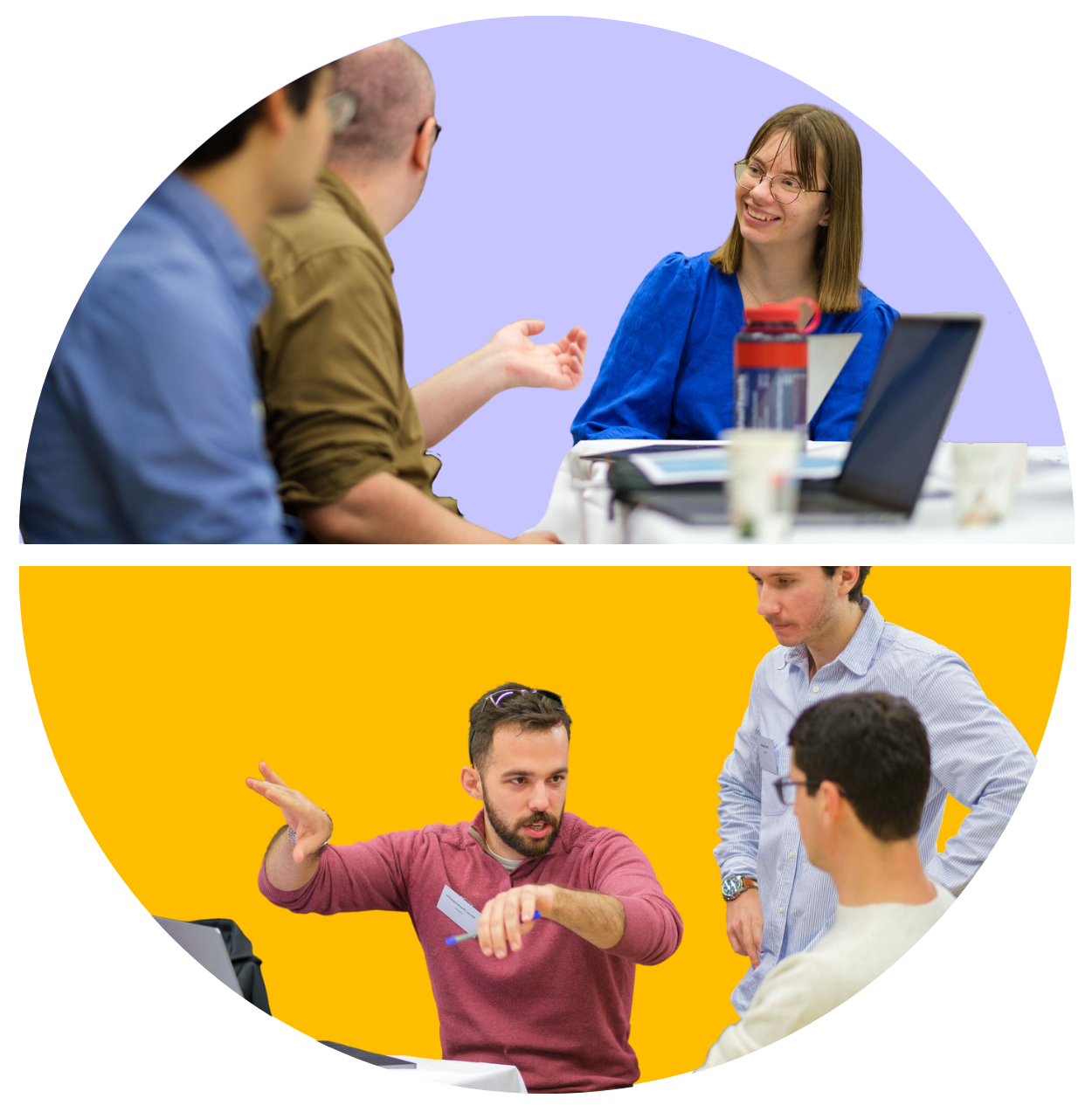
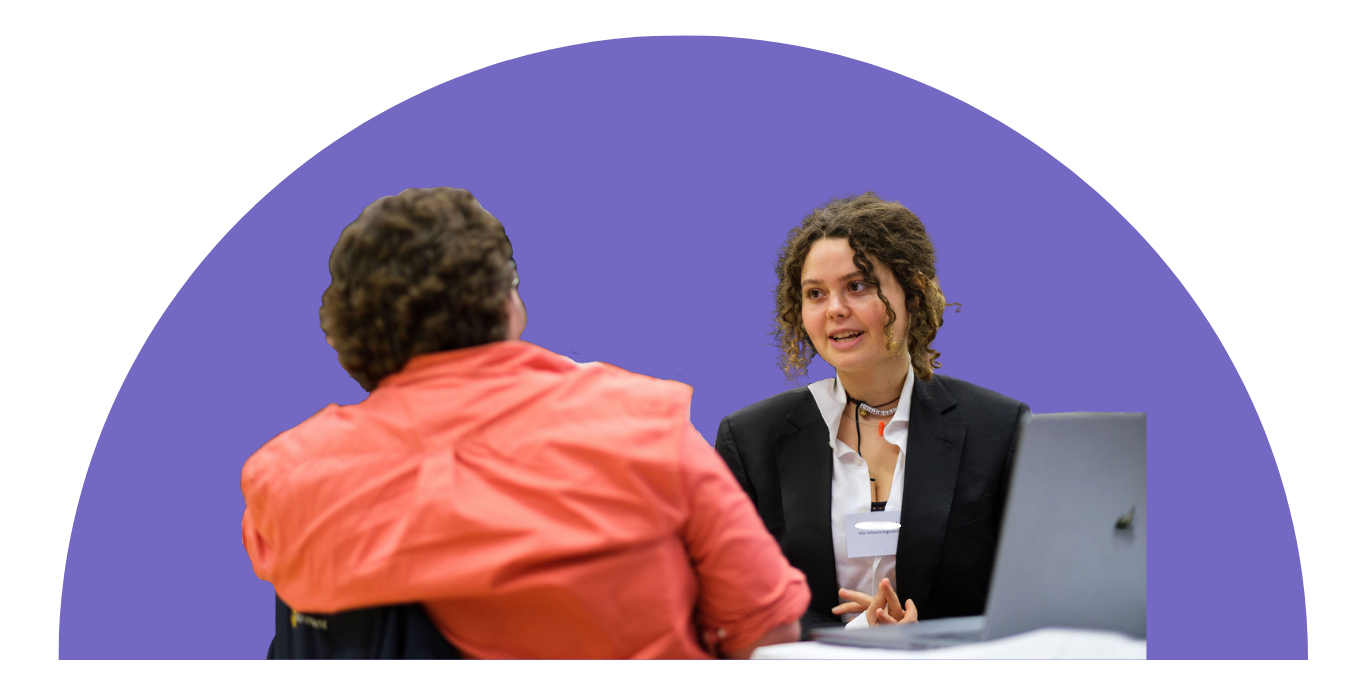
Following lunch, there will be a designated time for booth breakdown for organisations not participating in the second half of the event. During this time, new organisations will arrive and begin setting up their tables, preparing for the Thesis Fair. This session will be dedicated to students from these 6 programmes:
MSc Computational Science
MSc Computer Science
MSc Information Studies (Data Science Track and Information Systems Track)
MSc Logic
MSc Software Engineering
MSc Security and Network Engineering
The event will conclude with a borrel, allowing all participants to come together again over drinks and snacks.
Day Programme
The programme will be published closer to the event. But expect the day to look like this:
8:30 – 12:45 AI Thesis Fair
13:45 – 18:30 Thesis Fair
17:30 – 18:30 Borrel

Thesis Fair Registration Fees
To register, you must submit projects and fill out this form

